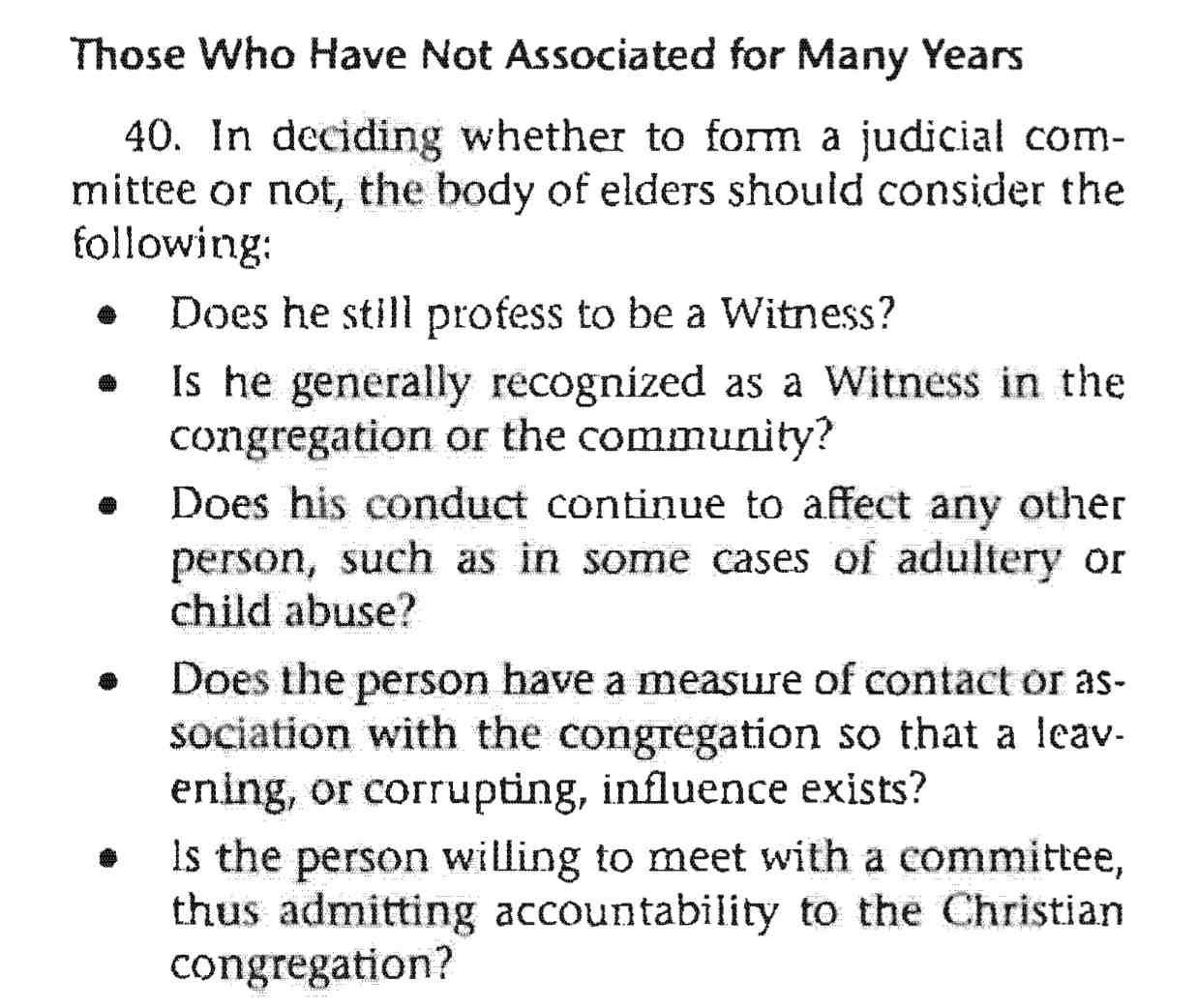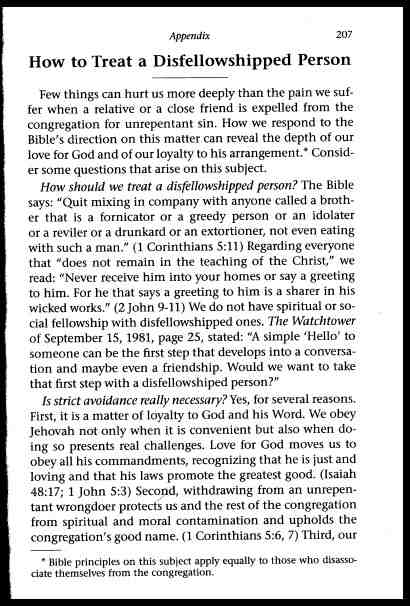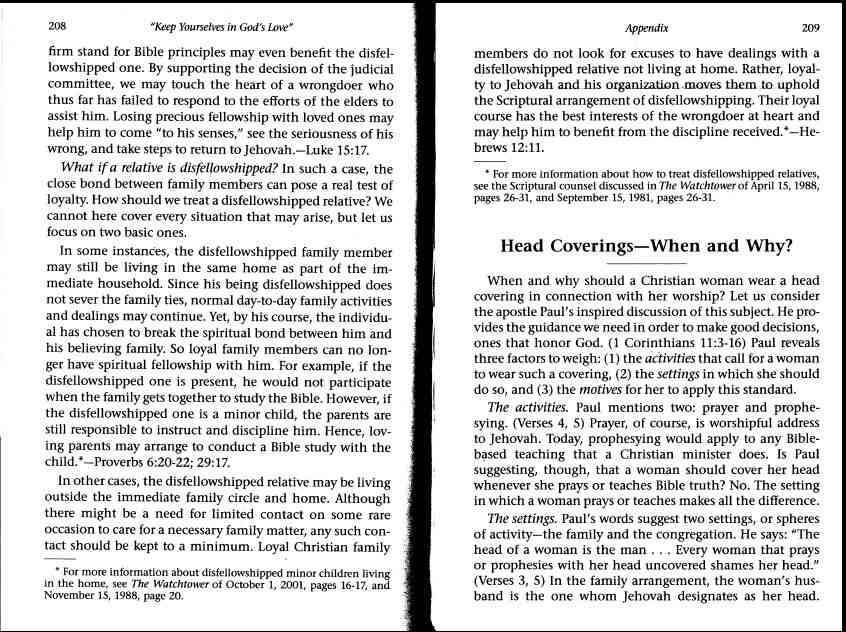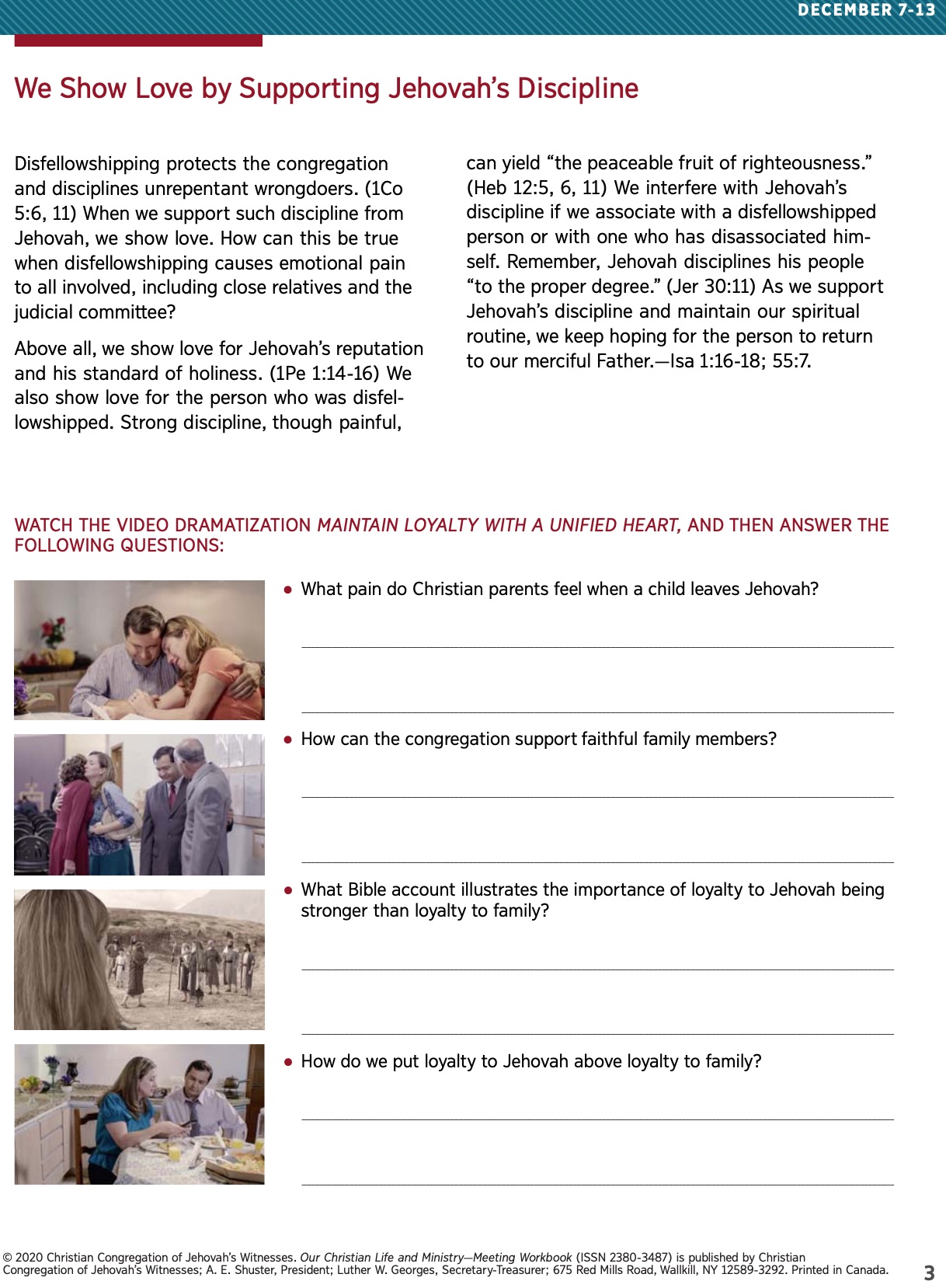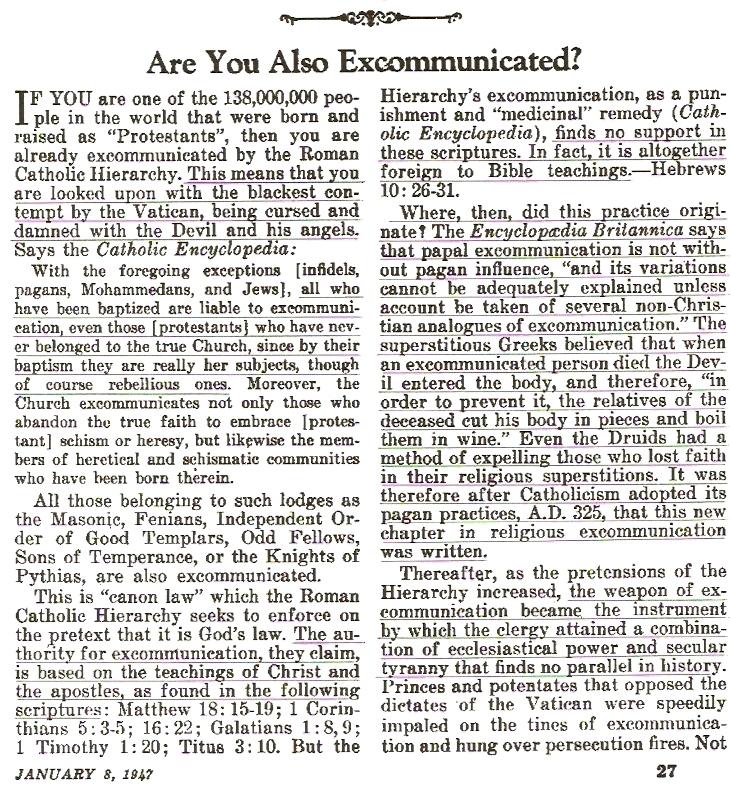home > questionable doctrine > disfellowship

Disfellowshipping and Shunning
Jehovah's Witnesses are disfellowshipped if they are considered to be unrepentant after engaging in serious sin. A disfellowshipped person is to be shunned by family and friends. Unless they are reinstated, this punishment is for the remainder of their life, causing tremendous emotional suffering. Whilst Scriptural precedence limits association with wrongdoers, Watchtower application of disfellowshipping seriously deviates from Bible guidelines.
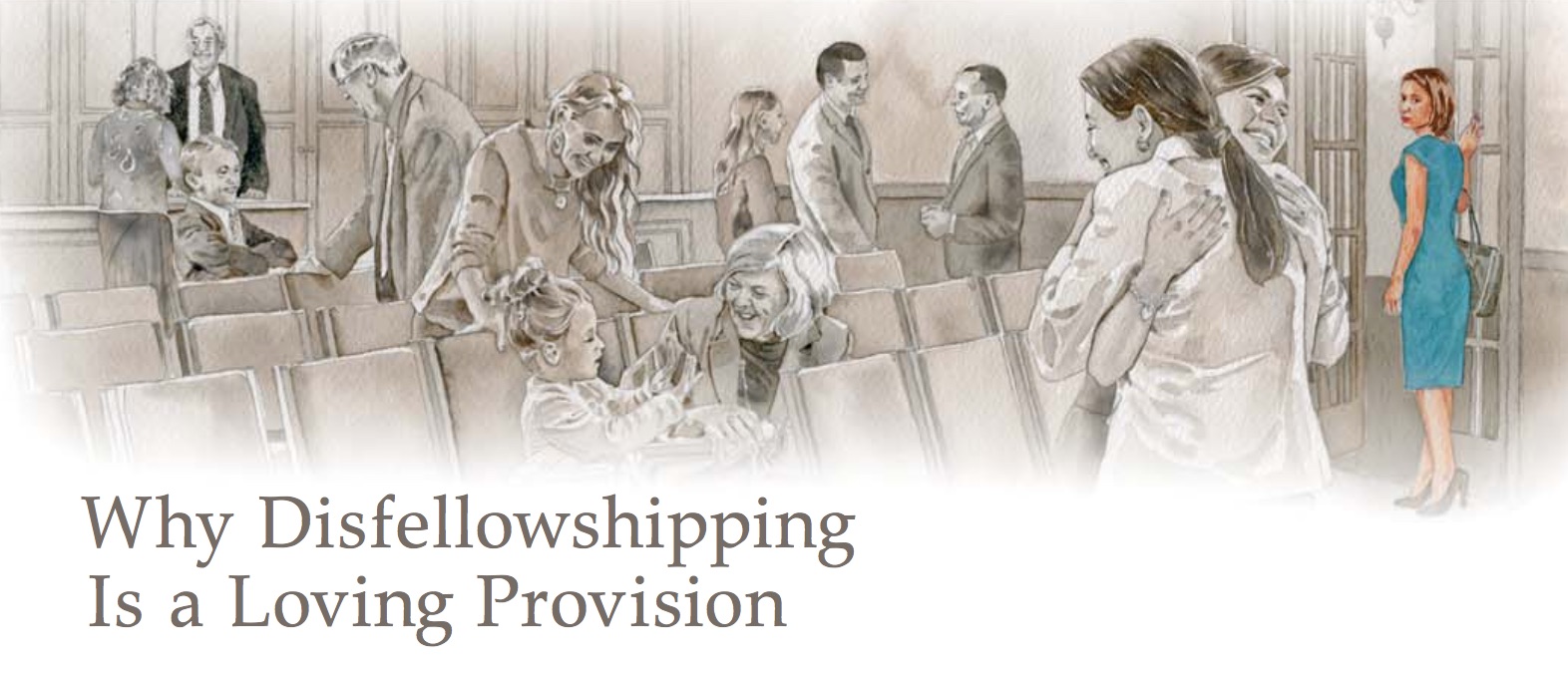 Watchtower 2015 April 15 p.29
Watchtower 2015 April 15 p.29
According to Watchtower figures, 1 in every 100 Jehovah's Witnesses is disfellowshipped each year - over 80,000 - of which two thirds will not be reinstated. That means there are over one million disfellowshipped Jehovah's Witnesses alive today that are being shunned, over 10% of the number of active Jehovah's Witnesses.(2)
Disfellowshipping is explained as expelling a wrongdoer, and shunning them to such degree as to not even say hello to them.

Watchtower 2011 Jul 15 p.23 simplified edition
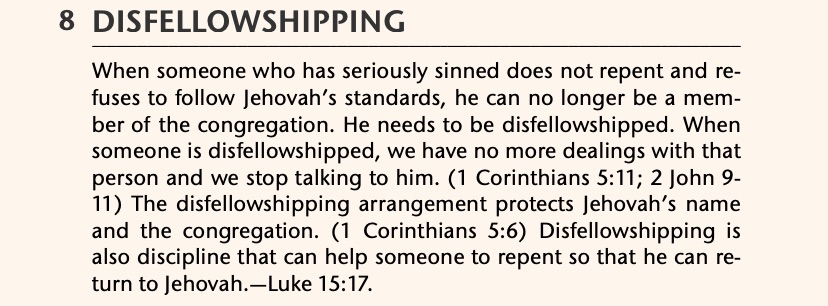
How to Remain in God's Love 2017 p.241
"Thus "disfellowshiping" is what Jehovah's Witnesses appropriately call the expelling and subsequent shunning of such an unrepentant wrongdoer." Watchtower 1981 Sep 15 p.22
"… a simple "Hello" to someone can be the first step that develops into a conversation and maybe even a friendship. Would we want to take that first step with a disfellowshiped person?" Watchtower 1981 Sep 15 p.25
Watchtower justifies that a person is only disfellowshipped if they are unrepentant after committing a serious sin, in order to protect the congregation and hopefully move the sinner to repent and return to the congregation. There are over 30 reasons listed as serious enough to warrant being disfellowshipped, ranging from disagreeing with Watchtower doctrine to smoking and fornication.
"We do well to remember that disfellowshipping is Jehovah’s arrangement and that it benefits the congregation and may benefit the wrongdoer. If an unrepentant wrongdoer were permitted to remain in the congregation, he could be a corrupting influence. (Gal. 5:9) In addition, he may not recognize the seriousness of his sin, and he may have little incentive to adjust his thinking and actions so that he can regain Jehovah’s favor." Watchtower Feb 2022 p.6
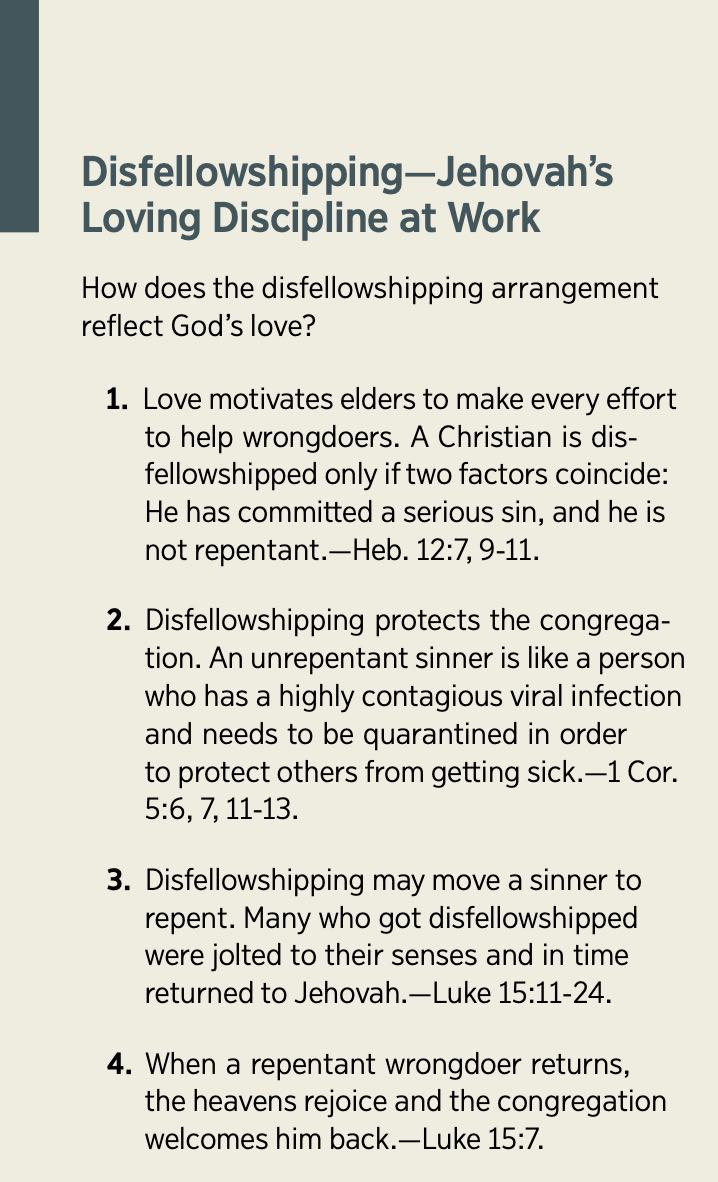
Watchtower 2021 Sep p.30
Put that way, the arrangement may appear to have merit, and these points will be examined in detail. On the other hand, the disfellowshipping arrangement causes serious emotional side affects.
- Disfellowshipped ones believing Watchtower doctrine expect to die at Armageddon.(3)
- Disfellowshipped ones that don't believe Watchtower teachings realise they will never again freely associate with their Jehovah's Witness family and friends.
- Children raised as Jehovah's Witnesses understand that the love of their parents is conditional on their remaining part of the religion.
- Some Jehovah's Witnesses feign belief in order to avoid being shunned by their loved ones.
The disfellowshipping arrangement affects more than just the disfellowshipped person, it is also traumatic for Jehovah's Witness family and friends.
"After his son was disfellowshipped, a brother named Luke admitted: "I blamed myself. I had nightmares about it. Sometimes I would cry and my heart ached." Elizabeth, a sister who faced a similar situation, agonized: "What did I do wrong as a mother? I felt that I must have failed to inculcate the truth in my son." ...
Esther, whose father was disfellowshipped, says: "I cried often ... I constantly worried about his well-being. I even had panic attacks." Watchtower 2021 Sep p.27
The word "disfellowship" does not appear in the Bible
It was not until 1952 that Watchtower introduced disfellowshipping as now practiced and the following review shows there is no Biblical justification for the extent to which Watchtower practices this unchristian form of manipulation. Though there is Scriptural precedence to limit association with brothers practicing wrongdoing, Watchtower application of disfellowshipping seriously deviates from Bible guidelines in the following ways:
- 2 John 10 says not to greet the Antichrist. The Watchtower uses this single scripture to support not saying hello to a disfellowshipped person.
- At Scriptures such as 1 Corinthians 5, Paul outlined limiting association with Christians that practice wrongdoing, not strict shunning.
- The Watchtower disfellowships for practices never discussed in the Bible such as smoking, gambling and having a blood transfusion.
- Disfellowshipping is extended to prevent immediate family members associating with their disfellowshipped relatives.
- The punishment applies forever, or until the Watchtower Society formally reinstates the person. It is considered irrelevant whether the person no longer practices the wrongdoing they were disfellowshipped for.
This extensive article is arranged under the following headings:
- Watchtower Treatment of Disfellowshipped People
- Reasons for which Jehovah's Witnesses can be Disfellowshipped
- Bible Guidelines for Treating Wrongdoers - Jesus, 1 Cor 5:10 & 2 Joh 10
- Historical Development of this Watchtower Practice
- Unscriptural Disfellowshipping Processes
Watchtower Rules on Treating those Disfellowshipped
Watchtower is very clear that a disfellowshipped person is not to be associated with under almost any circumstance, likening them to someone infected with a highly contagious virus.
"An unrepentant sinner is like a person who has a highly contagious viral infection and needs to be quarantined in order to protect other from getting sick." Watchtower 2021 Sep p.30
The word "hello" should not be uttered to these ones, even in the kingdom hall. This treatment is far harsher than how Jehovah's Witnesses treat a person of the world. Yet, as discussed later in this article, the Bible only said that it is the Antichrist that should not be greeted. Watchtower bundles all forms of wrongdoing as the same, and enforces the same harsh treatment for all disfellowshipped people regardless of the wrongdoing that was done. Hence, those disfellowshipped must not be greeted regardless of whether their "sin" was murder, changing beliefs or smoking cigarettes.
Total avoidance is extended beyond members of the congregation and to one's immediate family. Few people would consider it acceptable for a religion to demand parents shun their own child, and it is incomprehensible that the following quote was written in the twenty first century. If that is not bad enough, Watchtower uses emotional blackmail and says "Jehovah is watching us to see whether we will abide ... ."
"What if we have a relative or a close friend who is disfellowshipped? Now our loyalty is on the line, not to that person, but to God. Jehovah is watching us to see whether we will abide by his command not to have contact with anyone who is disfellowshipped.—Read 1 Corinthians 5:11-13.
Consider just one example of the good that can come when a family loyally upholds Jehovah’s decree not to associate with disfellowshipped relatives. A young man had been disfellowshipped for over ten years, during which time his father, mother, and four brothers “quit mixing in company” with him. At times, he tried to involve himself in their activities, but to their credit, each member of the family was steadfast in not having any contact with him. After he was reinstated, he said that he always missed the association with his family, especially at night when he was alone. But, he admitted, had the family associated with him even a little, that small dose would have satisfied him. However, because he did not receive even the slightest communication from any of his family, the burning desire to be with them became one motivating factor in his restoring his relationship with Jehovah." Watchtower 2012 Apr 15 p.12
In reading the supporting Scripture at 1 Corinthians 5, one cannot help notice that it does not mention the word disfellowship, does not indicate strict shunning, nor imply application to family members. Further, the concept that a son should be bribed back into the religion is a thinly veiled attempt at increasing membership numbers and hardly seems of spiritual value.
The same experience appears again in the Watchtower 2013 Jun 15 p.28. Here the person states, "Had my family associated with me even a little, say to check up on me, that small dose of association would have satisfied me and likely not allowed my desire for association to be a motivating factor to return to God." This shows how absolute the shunning of family is expected to be.
Watchtower 2013 Jan 1 p.16 even denies family communication by email, stating; "Do not look for excuses to associate with a disfellowshipped family member, for example, through e-mail." Interestingly, whilst the translation into most languages is the same, the Spanish edition extends this to "email, phone or text messaging."

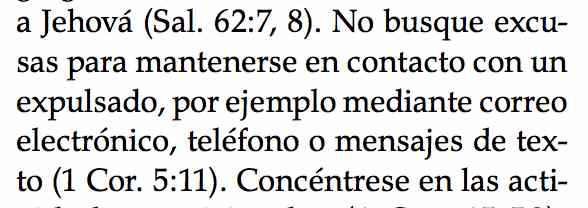
The existing standard on how to treat disfellowshipped ones was set in the Watchtower 1981 Sep 15, with no softening over time. The 1981 article was quoted in the Kingdom Ministry 2002 Aug and the 2008 book Keep Yourself in God's Love.
Due to these articles, there are former Jehovah's Witnesses that have been shunned by their Jehovah's Witness family for decades.
The following quotes regarding this treatment of disfellowshipped members spans decades.
"Despite our pain of heart, we must avoid normal contact with a disfellowshipped family member by telephone, text messages, letters, e-mails, or social media." Watchtower 2017 Oct p.16
“A conflict of loyalties may arise when a close relative is disfellowshipped. For example, a sister named Anne received a telephone call from her disfellowshipped mother. The mother wanted to visit Anne because she felt pained by her isolation from the family. Anne was deeply distressed by the plea and promised to reply by letter. Before writing, she reviewed Bible principles. (1 Cor. 5:11; 2 John 9-11) Anne wrote and kindly reminded her mother that she had cut herself off from the family by her wrongdoing and unrepentant attitude. “The only way you can relieve your pain is by returning to Jehovah,” Anne wrote.” Watchtower 2016 Feb p.29
"Are you personally proving yourself holy with regard to not associating with family members or others who have been disfellowshipped?" Watchtower 2014 Nov 15 p.14
"Really, what your beloved family member needs to see is your resolute stance to put Jehovah above everything else - including the family bond. … Do not look for excuses to associate with a disfellowshipped family member, for example, through e-mail."
Watchtower 2013 Jan 15 p.16
"And all members of the congregation need to be determined to avoid the company of disfellowshipped individuals." Watchtower 2011 Nov 15 p.5
"Suppose, for example, that the only son of an exemplary Christian couple leaves the truth. Preferring "the temporary enjoyment of sin" to a personal relationship with Jehovah and with his godly parents, the young man is disfellowshipped. … the Bible says "to quit mixing in company with anyone called a brother that is a fornicator. … They also realise that the word "anyone" in this verse includes family members not living under their roof. … Our hearts go out to those parents. After all, their son had a choice, and he chose to pursue his unchristian lifestyle rather than to continue to enjoy close association with his parents and other fellow believers. The parents, on the other hand, had no say in the matter. … But what will those dear parents do? Will they obey Jehovah's clear direction? Or will they rationalize that they can have regular association with the disfellowshipped son and call it, "necessary family business"? In making their decision, they must not fail to consider how Jehovah feels about what they are doing. … Today, Jehovah does not immediately execute those who violate his laws. He lovingly gives them an opportunity to repent from their unrighteous works. How would Jehovah feel, though, if the parents of an unrepentant wrongdoer kept putting Him to the test by having unnecessary association with their disfellowshipped son or daughter?" Watchtower 2011 Jul 15 p.31, p.32
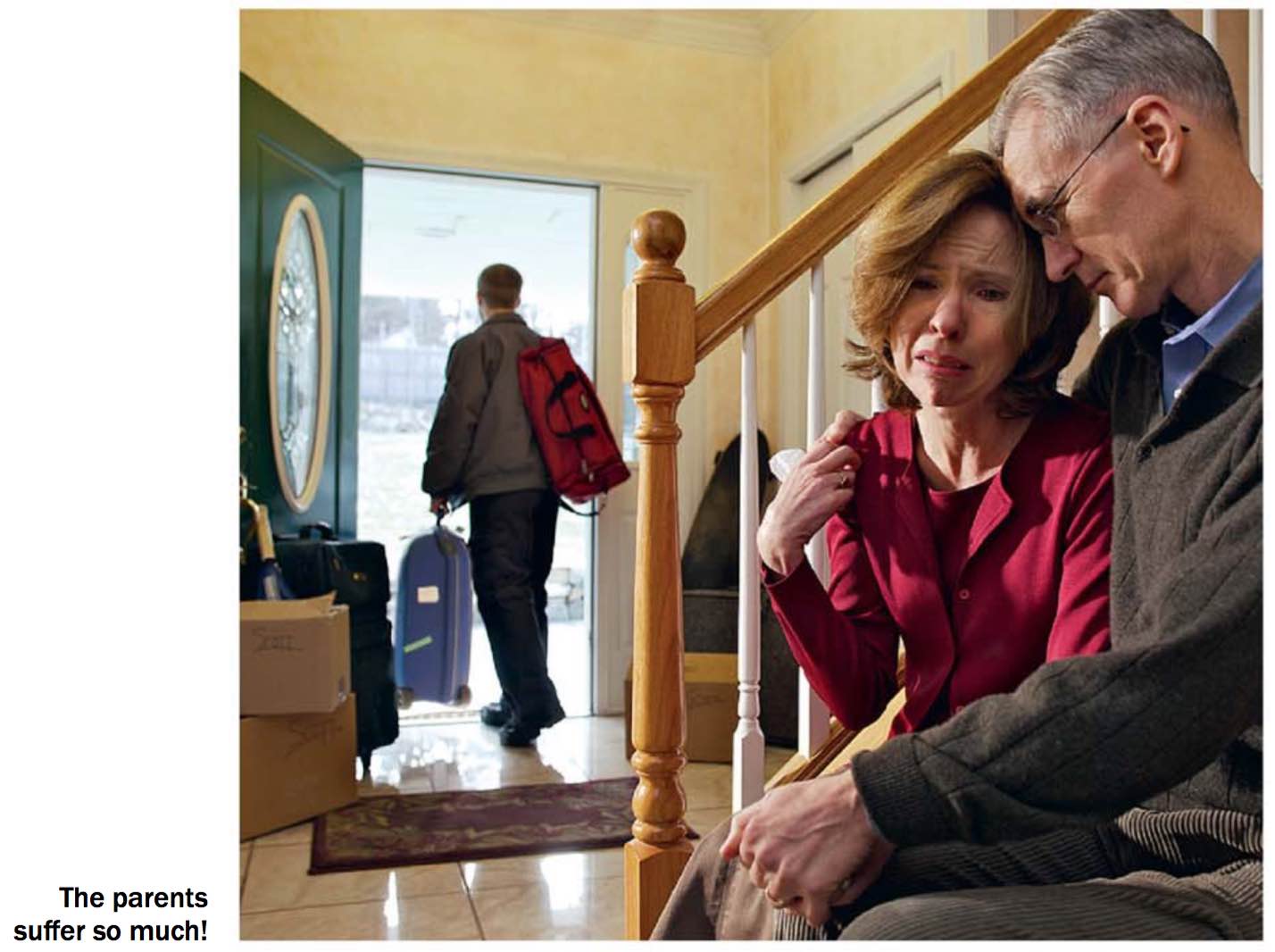
Watchtower simplified 2011 Jul 15 p.26
"By cutting off contact with the disfellowshipped or disassociated one, you are showing that you hate the attitudes and actions that led to that outcome. However, you are also showing that you love the wrongdoer enough to do what is best for him or her. Your loyalty to Jehovah may increase the likelihood that the disciplined one will repent and return to Jehovah." Watchtower 2011 Feb 15 p.32
"Is strict avoidance really necessary? Yes for several reasons. ... In other cases, the disfellowshipped relative may be living outside the immediate family circle and home. Although there might be a need for limited contact on some rare occasion to care for a necessary family matter, any such contact should be kept to a minimum." Keep Yourself in God's Love (2008) pp.207,208
"If your child is unrepentant and is a baptized Christian, he may receive the strongest form of discipline - being disfellowshipped from the congregation. The extent of contact that you will then have with him depends on his age and other circumstances." Watchtower 2007 Jan 15 p.20 Remaining Steadfast When a Child Rebels
"What about speaking with a disfellowshipped person? While the Bible does not cover every possible situation, 2 John 10 helps us to get Jehovah's view of matters: "If anyone comes to you and does not bring this teaching, never receive him into your homes or say a greeting to him." Commenting on this, The Watchtower of September 15, 1981, page 25, says: "A simple 'Hello' to someone can be the first step that develops into a conversation and maybe even a friendship. Would we want to take that first step with a disfellowshipped person?" Indeed, it is just as page 31 of the same issue of The Watchtower states: "The fact is that when a Christian gives himself over to sin and has to be disfellowshipped, he forfeits much: his approved standing with God; . . . sweet fellowship with the brothers, including much of the association he had with Christian relatives." Cooperating with the Scriptural arrangement to disfellowship and shun unrepentant wrongdoers is beneficial. It preserves the cleanness of the congregation and distinguishes us as upholders of the Bible's high moral standards. (1 Pet. 1:14-16) It protects us from corrupting influences. (Gal. 5:7-9) It also affords the wrongdoer an opportunity to benefit fully from the discipline received, which can help him to produce "peaceable fruit, namely, righteousness."-Heb. 12:11. After hearing a talk at a circuit assembly, a brother and his fleshly sister realized that they needed to make adjustments in the way they treated their mother, who lived elsewhere and who had been disfellowshipped for six years. Immediately after the assembly, the man called his mother, and after assuring her of their love, he explained that they could no longer talk to her unless there were important family matters requiring contact." Kingdom Ministry Aug 2002 p.3
"Cutting off from the Christian congregation does not involve immediate death, so family ties continue. Thus, a man who is disfellowshipped or who disassociates himself may still live at home with his Christian wife and faithful children The situation is different if the disfellowshipped or disassociated one is a relative living outside the immediate family circle and home. It might be possible to have almost no contact at all with the relative. Even if there were some family matters requiring contact, this certainly would be kept to a minimum, in line with the divine principle: "Quit mixing in company with anyone called a brother that is a fornicator or a greedy person [or guilty of another gross sin], . . . not even eating with such a man."-1 Corinthians 5:11. Understandably, this may be difficult because of emotions and family ties, such as grandparents' love for their grandchildren. Yet, this is a test of loyalty to God, as stated by the sister quoted on page 26." Watchtower 1988 Apr 15 p.27
"It is the disfellowshipped person who has made problems for himself and for his relatives." Watchtower 1981 Sep 15 p.27
"Yet, there might be some absolutely necessary family matters requiring communication, such as legalities over a will or property. But the disfellowshiped relative should be made to appreciate that his status has changed, that he is no longer welcome in the home nor is he a preferred companion." Watchtower 1970 Jun 1 pp.351-352
"The wrongdoer has to realize that his status is completely changed, that his faithful Christian relatives thoroughly disapprove of his wicked course and show this disapproval by limiting contacts to only those which are unavoidable" Watchtower 1963 Jul 15 p.444
"Jesus encouraged his followers to love their enemies, but God's Word also says to "hate what is bad." When a person persists in a way of badness after knowing what is right, when the bad becomes so ingrained that it is an inseparable part of his make-up, then in order to hate what is bad a Christian must hate the person with whom the badness is inseparably linked." Watchtower 1961 Jul 15 p.420
"Being limited by the laws of the worldly nation in which we live and also by the laws of God through Jesus Christ, we can take action against apostates only to a certain extent, that is, consistent with both sets of laws. The law of the land and God's law through Christ forbid us to kill apostates, even though they be members of our own flesh-and-blood family relationship. However, God's law requires us to recognize their being disfellowshiped from his congregation, and this despite the fact that the law of the land in which we live requires us under some natural obligation to live with and have dealings with such apostates under the same roof. Satan's influence through the disfellowshiped member of the family will be to cause the other member or members of the family who are in the truth to join the disfellowshiped member in his course or in his position toward God's organization. To do this would be disastrous, and so the faithful family member must recognize and conform to the disfellowship order. How would or could this be done while living under the same roof or in personal, physical contact daily with the disfellowshiped? In this way: By refusing to have religious relationship with the disfellowshiped." Watchtower 1952 Nov 15 p.703
With the advent of JW Broadcasting, discussion of shunning is accompanied by emotionally moving music and storylines, guilting the shunned and shunners into believing this inhumane treatment is deserved and required to manipulate the wrongdoer to "return to Jehovah."
The 2016 Convention outline No. 15 Loyally Uphold Jehovah’s Judgments (Symposium) —Shun Unrepentant Wrongdoers introduced the video with the statement;
"This can be a real trial when a family member is involved. We must not allow strong family ties to lead us to compromise loyalty to Jehovah and his organization (w13 1/15 15-16 16-20) In the dramatization that follows, note how loyalty results in a blessing."
2016 Convention Video on shunning
During the isolation of Covid-19, a letter to elders discussed that caution should be taken if allowing disfellowshipped members to view meetings via videoconference applications such as Zoom.
"Good judgment is required in determining whether to permit a disfellowshipped or disassociated person to connect to the meetings. If needed, the elders should remind him of when it would be appropriate to join and to leave such meetings." Direction Related to COVID-19 Pandemic for Bodies of Elders June 4, 2020 section 6
If a person dies in a disfellowshipped state they still are not to be associated with, so Witnesses are persuaded from attending their funeral.
"In "Questions from Readers" (The Watchtower, 1961, p. 544) the position was taken that a funeral for a disfellowshiped person was improper. The comment was made: "We never want to give the impression to outsiders that a disfellowshiped person was acceptable in the congregation when in truth and in fact he was not acceptable but had been disfellowshiped from it." A Christian congregation would not want its good name besmirched by having it associated with any to whom 2 John 9, 10 applied, even in their death." Watchtower 1977 Jun 1 p.347
It is quite shocking that under certain circumstances even a parent can be disfellowshipped for associating with their own disfellowshipped children.
"Normally, a close relative would not be disfellowshipped for associating with a disfellowshipped person unless there is spiritual association or an effort made to justify or excuse the wrongful course." Pay Attention to Yourselves and all the Flock p.103
Shepherd the Flock of God 2010 and 2019 editions reconfirm this, explaining that association with a relative can result in losing congregation privileges and even being disfellowshipped.
Assist those having undue association with disfellowshipped or disassociated relatives. ... If members of the congregation are known to have undue association with disfellowshipped or disassociated relatives who are not in the household, elders should counsel and reason with those members of the congregation from the Scriptures. ... If it is clear that a Christian is violating the spirit of the disfellowshipping decree in this regard and does not respond to counsel, it may be that he would not qualify for congregation privileges, which require one to be exemplary. He would not be dealt with judicially unless there is persistent spiritual association or he openly criticizes the disfellowshipping decision. Shepherd the Flock of God (2010) pp.114-116
"Unnecessary Association With Disfellowshipped or Disassociated Individuals: Willful, continued, unnecessary association with disfellowshipped or disassociated nonrelatives despite repeated counsel would warrant judicial action.—Matt. 18:17b; 1 Cor. 5:11, 13; 2 John 10, 11; lvs pp. 39-40.
If a member of the congregation is known to have unnecessary association with disfellowshipped or disassociated relatives who are not in the household, elders should use the Scriptures to counsel and reason with him. Review with him information from the Remain in God’s Love book, page 241. If it is clear that a Christian is violating the spirit of the disfellowshipping decree in this regard and does not respond to counsel, he would not qualify for congregation privileges, which require one to be exemplary. He would not be dealt with judicially unless there is persistent spiritual association or he persists in openly criticizing the disfellowshipping decision." Shepherd the Flock of God (2019) ch12:17
Inactive Ones
A person that become inactive from the congregation or fades out, is still expected to be shunned if they do not abide by Watchtower doctrine, even if not disfellowshipped. This was discussed in the 2016 Regional Convention.
"Loyal Christians would not associate with “anyone called a brother” who is practicing serious sin. This is true even if no congregation action has been taken, as may be the case with an inactive one (w85 7/15 19 14)"
This is in stark contrast with the information supplied to the 2015 Royal Commission into Institutional Responses to Child Sexual Abuse in Australia, who described Jehovah's Witnesses as a cruel religion for their practice of shunning. The Watchtower representatives countered that a Jehovah's Witness does not need to disassociate or being disfellowshipped, they may simply become inactive, in which case they will not be shunned. This was highly dishonest, as becoming inactive will usually result in a level of shunning, as directed above.
Watchtower Reasons for Disfellowshipping
Bible discussion of shunning in 1 Corinthian's 15 and 2 John is limited to just the following areas; Fornication, Greed, idolatry, Revilers, Practicing Drunkenness, Extortion and One who does not remain in the teaching of the Christ.
This list should be the full extent of reasons for which to be disfellowshipped. In fact, Diotrephes was reprimanded for attempting to throw people out of the congregation unnecessarily.
3 John 9,10 "I wrote something to the congregation, but Diotrephes, who likes to have the first place among them, does not receive anything from us with respect. That is why, if I come, I will call to remembrance his works which he goes on doing, chattering about us with wicked words. Also, not being content with these things, neither does he himself receive the brothers with respect, and those who are wanting to receive them he tries to hinder and to throw out of the congregation."
Watchtower has however created a list of over 30 offences that can result in being disfellowshipped. Following is a collation of this the vast list.
"Shepherd the Flock of God" 2019 Edition onwards
The Elder's handbook, "Shepherd the Flock of God" lists the offences that can result in being disfellowshipped. Form S-77-E 7/21 RECORD OF DISFELLOWSHIPPING, DISASSOCIATION, OR JUDICIAL REPROOF requires the Judicial Committee to list one of the offences appearing in Chapter 12:2-39. The index to Chapter 12 provides an excellent summary of these reasons, which is made up of 18 primary offences, or 29 when including the secondary ones.
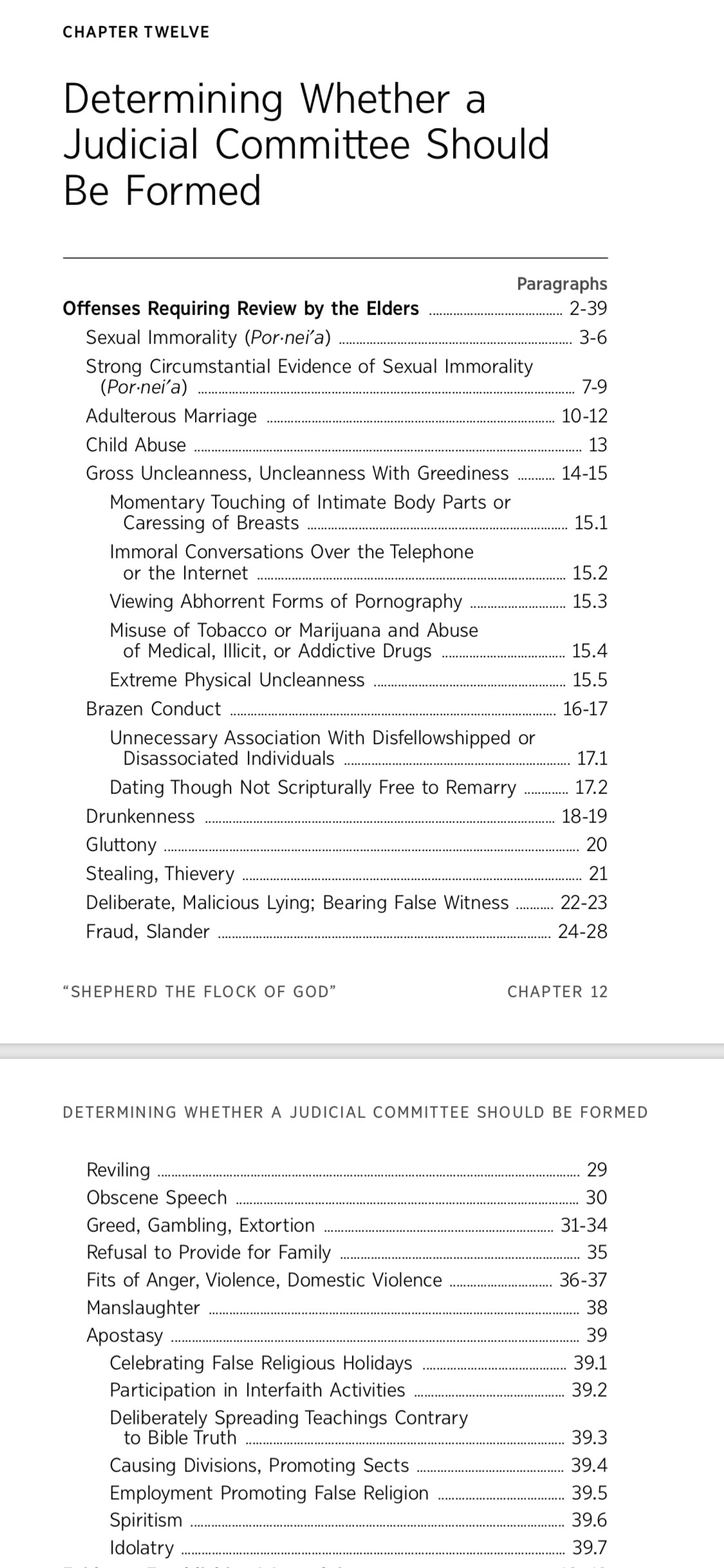
It is important to note that there are additional reasons listed under Disassociation. Disassociation is not only applied to a person that requests they no longer be considered one of Jehovah's Witnesses. Form S-77-E 7/21 provides direction that disassociation can also include three additional offences listed in chapter 18. These include:
- Non-neutral activity
- Joining another religion
- Blood Transfusions
It appears quite arbitrary that taking a blood transfusion is listed as a reason for disassociation instead of disfellowshipping. The reason behind this is quite shocking. As explained at Bulgaria and Blood Transfusions, the Bulgarian government would only grant Jehovah's Witnesses legal recognition if they agreed to no longer disfellowship members for accepting a blood transfusion. In 1997, Watchtower agreed to this requirement, then deceitfully listed accepting blood as being considered a form of disassociation.
"Shepherd the Flock of God" 2010 Edition

In the 2010 edition of "Shepherd the Flock of God", chapter 5 - "Determining Whether a Judicial Committee Should Be Formed" - outlines the reasons for which a person can be disfellowshipped. This chapter extends from pages 58 to 79, and yet page 58 clarifies that "This list is not comprehensive. There may be other matters that would also merit the attention of a judicial committee."
The following categories and subcategories are as laid out in "Shepherd the Flock of God" 2010 ed.
"Manslaughter: p.59
Murder or loss of life through carelessness or violating a traffic law
Attempted Suicide
Por.neia: p.59 immoral use of the genitals with lewd intent.
Brazen conduct, loose conduct: pp.60,61 an insolent, contemptuous attitude made evident by a practice of these things:
- unnecessary association with disfellowshipped nonrelatives
- child sexual abuse
- pursue a romantic relationship with a person though not legally or Scripturally free to marry
- stayed all night in the same house with a person of the opposite sex (or in the same house with a known homosexual) under improper circumstances
Gross uncleanness, uncleanness with greediness: pp.61-65
vices that are not classes as por.neia but that could lead to ones being disqualified from Gods Kingdom."
- Passion-arousing heavy petting or caressing of breast
- A practice of engaging in immoral conversations by telephone, in Internet chat rooms, or through similar electronic means
- An entrenched practice of viewing abhorrent forms of pornography that is sexually degrading
- Misuse of tobacco
- Extreme physical uncleanness
Misuse of addictive drugs: p.65
Apostasy: pp.65,66
- Celebrating false religious holidays
- Participation in interfaith activities
- Deliberately spreading teachings contrary to Bible truth as taught by Jehovah's Witnesses
- Causing divisions and promoting sects
- Continuing in employment that makes on an accomplice to or a promoter of false worship
- The practice of spiritism
- Idolatry
Drunkenness: p.66
Gluttony: p.67
Stealing, thievery: p.67
Deliberate, malicious lying; bearing false witness: p.67
Fraud, slander: p.67
Reviling: p.68 subjecting a person to insulting speech, heaping abuse upon him.
Obscene speech: p.69
Greed gambling, extortion: pp.69,70 Includes A Christian who greedily and unrepentantly extorts a high bride-price
Adamant refusal to provide materially for ones own family: p.70
Fits of anger, violence: p.70 Includes professional boxing
Grounds as listed in 1986 Index
dx86-11 Disfellowshipping
grounds: w98 3/15 22; w92 7/1 19; w89 9/15 18; w88 4/15 26-27; it-1 788
absolute endangerment of mate’s spirituality: w88 11/1 22-23
apostasy: w89 10/1 19; w86 3/15 15; w86 4/1 30-31; w86 10/15 31
bestiality: it-1 292
bloodguilt: w06 9/15 30
blood transfusion: jv 183-184
dishonest practices: w86 11/15 14
drunkenness: it-1 656
employment involving gambling: w95 5/15 23
extortion: w89 1/15 22; it-1 789
extreme physical abuse of family members: lv 221; g01 11/8 12; fy 150; w88 11/1 22
fits of anger: w10 6/15 30; lv 221; g01 11/8 12; g97 6/8 20; fy 150; g93 2/8 14
fornication: w06 7/15 29-30; it-1 863
fraud: om 142-143
gluttony: w04 11/1 30-31
greed in relation to bride-price: w98 9/15 25
gross uncleanness: lv 137; w06 7/15 30-31
loose conduct: w06 7/15 30-31
lying: w09 6/15 18-19; lv 163; g00 2/8 21
obscene speech: lv 136-137
persistent gambling: w89 7/15 30
polygamy: jv 176
pornography in certain cases: w06 7/15 31
promoting sects: it-2 886
reviling: lv 138; w96 7/15 17-18; it-1 991; it-2 802
sexual abuse of children: g93 10/8 10
slander: w89 10/15 14; om 142-143
subversive activity: w95 10/1 31
use of tobacco: w06 7/15 30-31; w95 5/15 23
whether violation of secular law is: w86 10/1 31
willful nonsupport of family: lv 220-221; w88 11/1 22
Collated list of Offences
Using the reasons listed above, and found in other publications, the following can result in being disfellowshipped or disassociated.
The abbreviations refer to the following publications:
- Kingdom Ministry (km)
- Watchtower (w)
- Jehovah's Witnesses - Proclaimers of Gods Kingdom (1993) (jv)
- Pay Attention to Yourselves and to All the Flock (ks91-E)
- Organised to Accomplish Our Ministry (om)
- Insight on the Scriptures, Volume 1 or 2 (it-1 or 2)
- Correspondence Guidelines 2011 revision (cg)
- Adultery (sexual intercourse with a person other than your marriage mate), includes;
- Abandoning wife and eloping with another woman - w79 11/15 31-2, w76 p.728
- Planned adultery to break Scriptural marriage ties - w83 3/15 p.29
- Remarriage without Scriptural permission - w56 10/1 p.597
- Polygamy - jv 176
- Dating a person not legally divorced - ks91-E p.135
- Apostasy - w83 4/1 pp.22-4, km 8/80 pp.1, 4. includes;
- Rebellion against Jehovah's organization - w63 7/1
- Promoting sects - it-2 886
- Associating with disfellowshipped people including;
- Friends - ks91-E p.103, w81 9/15 pp.25-6, w55 10/1 p.607
- Family - ks91-E p.103
- Blood and blood transfusions - w61 1/15 ks91-E p.95, jv p.183-4
- Drug use - ks91-E p.96
- Drunkenness - ks91-E p.95, it-1 656
- Dishonest business practices - w63 7/1, w86 11/15 14
- Employment violating Christian principles - km 9/76 p.6, km 2/74
- Working for any religious organization - ks91-E p.95
- Working in a gambling institution - ks91-E p.136
- Selling tobacco - ks91-E p.96
- Contract work at a military establishment
- False worship. Includes;
- Attending another church ks91-E p.94
- Following mourning customs that involve false worship - w85 4/15 p.25
- Fornication it-1 863
- Bestiality - w83 6/1 p.25
- Incestuous marriage - w78 3/15 p.26
- Artificial insemination and surrogate motherhood.
- "True Christians, therefore, avoid surrogate motherhood as well as any procedures that involve the use of donated sperm, eggs, or embryos" g04 9/22;
- "Artificial insemination of a married woman by a donor other than her husband makes her guilty of adultery" g74 8/8 p.28
- sexual abuse of children - g93 10/8 p.10
- Reviling - ks91-E p.94, w96 7/15 pp.17-18; it-1 p.991; it-2 p.802
- Fraud - ks91-E p.94, om pp.142-3
- Gambling or related employment - w80 9/1, ks91-E p.136
- Gluttony - w86 5/1
- Greediness, this in used to include;
- gambling ks91-E p.95
- extortion ks91-E p.95, w89 1/15 22, it-1 p.789
- greed in relation to bride-price: w98 9/15 p.25
- Homosexuality - w83 6/1 pp.24-6
- Idolatry - w52 3/1 p.138
- Loose conduct - ks91-E pp.93, 96, w83 3/15 p.31, w73 9/15 p.574, it-2 p.264, ks91-E p.93, w83 3/15 p.31, w73 9/15 pp.574-6, w97 9/1 p.14, it-2 p.246. This includes;
- Sexual perversion
- transvestism/sex change - cg p.98
- Disregard for Jehovah's moral standards
- Disrespect, disregard or even contempt for standards, laws and authority
- Lying - ks91-E p.94, g00 2/8 p.21
- Non neutral activities (involvement in politics and the military) - ks91-E p.96
- Military service and non military civilian service - ks91-E pp.96,140 (certain civilian work was made a conscience matter in w96 5/1 p.20)
- Obscene speech - ks91-E p.95
- Parents condoning immorality - w56 p.566
- Political involvement, including voting or holding a political card in Malawi - ks91-E p.96 (w99 11/1 p.28 made voting a conscience matter)
- Porneia. Includes oral and anal sex between married couples, mutual masturbation between persons not married to each other, homosexuality, lesbianism, fornication, adultery, incest, and bestiality. - ks91-E p.93
- Slander - ks91-E p.94, w63 7/1, w89 10/15 p.14, om p.142
- Smoking or selling tobacco - km 2/74, ks91-E p.96
- Spiritism (includes yoga w02 8/1 p.22) - w55 10/1 p.607
- Stealing, thievery - om pp.142-5, ks91-E p.94
- Subversive activity - w95 10/1 p.31
- Uncleanness
- Sexually perverse practices within marriage, such as oral and anal sex - w83 3/15 p.31
- Heavy petting and breast fondling - ks91-E p.92
- Touching of sexual parts - ks91-E p.91
- Practice of viewing abhorrent Pornography - w2012 3/15 p.31
- Violation of secular law if flagrant attitude - w86 10/1 p.31
- Violence, extreme physical abuse, fits of anger - ks91-E p.96, w75 p.287, g01 11/8 p.12
- Includes Boxing w81 7/1 pp.30-1, ks91-E p.142
- Wilful non support of family, endangerment of mates spirituality - w88 11/1 pp.22-3, km 9/73 p.8, ks91-E p.95
- Worldly celebrations such as Christmas - ks91-E p.95 (It appears celebrating birthdays is not a reason to be disfellowshipped)
Rather than restricted to the usual definition of sexual perversion, the Watchtower defines "loose conduct" as including "disrespect to elders". This enables this term to be used to disfellowship for a wide range of offences not elsewhere covered, and as such is used to cover all manner of sins, such as refusal to cease fellowship with disfellowshipped people, or even being contemptuous in a judicial meeting where no other sin can be proven.
Watchtower claims that disfellowshipping only occurs to those that commit serious sins and are unrepentant.
"Two factors — which must coincide — result in the disfellowshipping of one of Jehovah’s Witnesses. First, a baptized Witness commits a serious sin. Second, he does not repent of his sin." Watchtower 2015 Apr 15 p.29
Whilst this may appease the conscience of Jehovah's Witnesses shunning loved ones, it is not realistic. Examining the list of offences reveals a number of areas hardly serious enough to merit complete isolation. Further, a substantial percentage of those disfellowshipped in recent times are for conscientiously objecting to Watchtower doctrine. Whilst Watchtower ignominiously labels this as apostasy, a person that has carefully reasoned the religion does not teach truth cannot agree leaving is a sin, or ever accept they have done anything requiring repentance.
Bible guidelines
Watchtower differentiates between "marking"(4) and "disfellowshipping." Marking is applied to mild wrongdoing, ("not yet gross sin for which they might be disfellowshipped" Watchtower 1982 Feb 1 p.31), the person is not named, and can be associated with. On the other hand, a disfellowshipped person is publicly named and must be shunned under almost all circumstances. It is important to note that the Bible never uses the term disfellowship and makes no such distinction from marking. On examination of the Scriptures used to justify disfellowshipping, it becomes apparent that Christian writers prescribed marking a Christian wrongdoer, not the strict shunning enforced by Watchtower.
Jesus' Advice
Jesus commanded that we not judge but love all, particularly those we consider our enemies.
Luke 6:27-37 "But I say to YOU who are listening, Continue to love YOUR enemies, to do good to those hating YOU, to bless those cursing YOU, to pray for those who are insulting YOU. To him that strikes you on the one cheek, offer the other also; and from him that takes away your outer garment, do not withhold even the undergarment.Give to everyone asking you, and from the one taking your things away do not ask [them] back. Also, just as YOU want men to do to YOU, do the same way to them. And if YOU love those loving YOU, of what credit is it to YOU? For even the sinners love those loving them.And if YOU do good to those doing good to YOU, really of what credit is it to YOU? Even the sinners do the same.Also, if YOU lend [without interest] to those from whom YOU hope to receive, of what credit is it to YOU? Even sinners lend [without interest] to sinners that they may get back as much. To the contrary, continue to love YOUR enemies and to do good and to lend [without interest], not hoping for anything back; and YOUR reward will be great, and YOU will be sons of the Most High, because he is kind toward the unthankful and wicked. Continue becoming merciful, just as YOUR Father is merciful. Moreover, stop judging, and YOU will by no means be judged; and stop condemning, and YOU will by no means be condemned."
Jesus introduced the standard on how Christian wrongdoers should be treated, saying at Matthew 18:15-17:
"Moreover, if your brother commits a sin, go lay bare his fault between you and him alone. If he listens to you, you have gained your brother. But if he does not listen, take along with you one or two more, in order that at the mouth of two or three witnesses every matter may be established. If he does not listen to them, speak to the congregation. If he does not listen even to the congregation, let him be to you just as a man of the nations and as a tax collector."
Jesus did not say to shun the unrepentant wrongdoer, but to treat them as a tax collector, which he himself spoke to and ate with - Matthew 9:11.
Jesus did not avoid those considered apostates, speaking constantly with the scribes & Pharisees, whom he strongly condemned at Matthew chapter 23. On one occasion, he allowed the Pharisee Nicodemus to visit for a Bible discussion, as recorded at John 3:1-21. Jesus even spoke directly to the original apostate, Satan.
1 Corinthians 5:11
The majority of information on how to treat wrongdoers within the congregation comes from Paul and the main support the Watchtower uses to enforce shunning is from 1 Corinthians 5.
Paul showed a balanced approach to wrongdoers, advising not to socialise with such ones, but to still admonish [them] as a brother. 2 Thessalonians is key to understanding that wrongdoers should be marked, not disfellowshipped.
2 Thessalonians 3:6, 14-15 Now we are giving YOU orders, brothers, in the name of the Lord Jesus Christ, to withdraw from every brother walking disorderly and not according to the tradition YOU received from us . 14 But if anyone is not obedient to our word through this letter, keep this one marked, stop associating with him, that he may become ashamed. 15 And yet do not be considering him as an enemy, but continue admonishing him as a brother.
Paul did not indicate that marking was only for non-serious sin as the word through this letter at 2 Thessalonians included those not glorifying the name of our Lord Jesus, those refusing to work for a living, and any who had been seduced by apostasy. Paul did not say to disfellowship and shun such people, but rather instructed the congregation to mark or take note of such a person, yet continue admonishing him as a brother. In similar vein the following scriptures do not instruct complete shunning of the person, but rather to take note so as not to be influenced by their wrong ways.
Romans 16:17 "Now I exhort YOU, brothers, to keep your eye on (the word 'mark' is used in many translations) those who cause divisions and occasions for stumbling contrary to the teaching that YOU have learned, and avoid them. "
Titus 3:10 "As for a man that promotes a sect, reject him after a first and a second admonition; knowing that such a man has been turned out of the way and is sinning, he being self-condemned."
At 1 Corinthians 5 Paul specifically outlined practices for which to cease mixing with a brother, yet this too is similar to the advice given when marking a brother.
1 Corinthians 5:11 "But now I am writing YOU to quit mixing in company with anyone called a brother that is a fornicator or a greedy person or an idolater or a reviler or a drunkard or an extortioner, not even eating with such a man. For what do I have to do with judging those outside? Do YOU not judge those inside, while God judges those outside? Remove the wicked [man] from among yourselves."
1 Corinthians does not say to totally shun a brother who is a wrong doer, rather it says to quit mixing in company with such a person and not eat with such a man and hence refers to socialising. As the Watchtower has explained, this refers to socialising as friends.
"God's Word states that we should 'not even eat with such a man.' (1 Cor. 5:11) Hence, we also avoid social fellowship with an expelled person. This would rule out joining him in a picnic, party, ball game, or trip to the mall or theater or sitting down to a meal with him either in the home or at a restaurant." Kingdom Ministry 2002 Aug p.3
This does not state that this type of person must never be spoken to. As Paul explained at 2 Thessalonians 3:14-15 (quoted earlier), if they are at a meeting it would be reasonable to encourage them. Most certainly a polite greeting is acceptable.
1 Corinthians is also specific as to who these words apply to. This advice is in regards to a person "called a brother" who "is" a wrongdoer. No indication is given that they should be avoided when they are no longer recognised as a Jehovah's Witness brother. Nor does it say to shun a person who has stopped their wrongdoing. It is regularly the case that a teenage Witness is disfellowshipped for smoking or fornication. Years later they no longer practice what they were disfellowshipped for and are no longer known in the community as a brother, and so their continued shunning is unjustified.
It can also be noted that Paul did not insist that everyone participate in the shunning. Later he wrote that the "majority" participate in the rebuke, showing that some in the congregation may choose not to show rebuke to the person.
2 Corinthians 2:5-6 "Now if anyone has caused sadnessM, he has saddened, not me, but all of YOU to an extent-not to be too harsh in what I say. This rebuke given by the majority is sufficient for such a man, …"
The New World Translation reference M shows Paul was here referring to the situation discussed at 1 Corinthians 5, (as do Christian scholars).
Paul gave similar advice on a number of occasions to 'mark' and 'avoid' wrongdoers. This does not mean that the person must be totally ignored, never uttered a greeting, avoiding eye contact, crossing the street to get away from, all common experiences of disfellowshipped Jehovah's Witnesses.
2 John 10
Watchtower's extreme treatment of not even saying "hello" to a disfellowshipped Witnesses is not based on the above scriptures, but rather on a single statement at 2 John 7-11:
For many deceivers have gone forth into the world, persons not confessing Jesus Christ as coming in the flesh. This is the deceiver and the antichrist. Look out for yourselves, that YOU do not lose the things we have worked to produce, but that YOU may obtain a full reward. Everyone that pushes ahead and does not remain in the teaching of the Christ does not have God. He that does remain in this teaching is the one that has both the Father and the Son. If anyone comes to YOU and does not bring this teaching, never receive him into YOUR homes or say a greeting to him. For he that says a greeting to him is a sharer in his wicked works.
2 John specifically states it is referring to the antichrist, and hence should not be applied across the board to all disfellowshipped people as done by Watchtower.
In order to justify their stance, Watchtower describes those that leave as apostate and of the Antichrist, saying that "the word apostasy comes from a Greek word that literally means a standing away from but has the sense of desertion, abandonment or rebellion ... [and included] abandonment of right moral standards ... willfully abandoning the Christian congregation thereby become part of the 'antichrist." Watchtower 1985 Jul 15 p.31. In reality, many who leave continue to follow Jesus and the Bible, but have come to the realisation that Watchtower leaders are not directed by Jesus.
Interestingly, John's advice here was not limited to former Christians. It included anyone denying Christ. This included Jews that rejected Jesus and people of the nations worshipping other Gods. To be consistent, if Watchtower uses this Scripture to prevent saying hello to former Jehovah's Witnesses, it should also apply it this strict stance to everyone else.
The meaning of the phrase "never receive him into your homes" should be understood in the context of first century Jewish hospitality. Since Christians held meetings for worship in their homes, inviting a denier of Christ into a home could be viewed as sharing worship with non-Christians. Likewise, the term to never "say a greeting" needs to be understood in light of first century practice. In the following article, Watchtower incorrectly claims that John used the term "greeting" to indicate a simple hello.
"John here used khairo, which was a greeting like good day or hello. (Acts 15:23; Matthew 28:9) He did not use aspazomai (as in verse 13), which means to enfold in the arms, thus to greet, to welcome and may have implied a very warm greeting, even with an embrace. (Luke 10:4; 11:43; Acts 20:1, 37; 1 Thessalonians 5:26) So the direction at 2 John 11 could well mean not to say even hello to such ones." Watchtower 1988 Apr 15 p.27
This article incorrecly claims John chose the word khairo instead of aspazomai, because khairo forbids even a simple greeting, whereas aspazomai means an affectionate embrace, or welcome. This is incorrect, as both terms refer to an affectionate or respectful greeting. Strong's Concordance defines the following;
- 5463 chairo {khah'-ee-ro} 1) to rejoice, be glad 2) to rejoice exceedingly 3) to be well, thrive 4) in salutations, hail! 5) at the beginning of letters: to give one greeting, salute
- 783 aspazmos {as-pas-mos} a salutation, either oral or written
- 782 aspazomai o salute one, greet, bid welcome, wish well to .. like the Latin salutare, our 'pay one's respects to,' of those who show regard for a distinguished person by visiting him (see https://www.blueletterbible.org/lang/lexicon/lexicon.cfm?Strongs=G782 as of 2nd Sep 2020)
2 John does not indicate a polite greeting is wrong. John use of khairo shows that a person is a sharer in the Antichrist's wicked works if he shows acceptance and agreement with the evildoers cause or teachings by wishing them favour and success.
Watchtower misuses this single comment from 2 John to dictate that every disfellowshipped or disassociated person not even be politely greeted. This is applied regardless of what the person was disfellowshipped for, including a long list of Society originated rules such as gambling, smoking, or authorising a blood transfusion. Every single one of a disfellowshipped persons Witness friends is told to never greet them again, unless they repent and are formally reinstated by the Watchtower Society. I am aware of friends whose own mothers or their own children have not spoken to them for upwards of 20 years. Yet such shunning is only ever discussed once, was only to apply to the Antichrist, and as such is being misused to its extremity.
Historical Watchtower Development
Disfellowshipping was not practiced in its current form by the Watchtower Society until 1952.
Russell discussed disfellowshipping and avoiding wrongdoers as early as 1893. However, this was not applied to Watchtower followers, but rather that Christians in general should avoid those who show themselves to be untrue to God.
"We are not of those who disfellowship Christian brethren on account of some differences of opinion; but when it comes to the point of denying the very foundation of all christianity we must speak out and withstand all such to the face, for they become the enemies of the cross of Christ." Watchtower 1882 Dec p.423
"To be separate does not mean to be friends and companions, or to be in fellowship on any grounds. It means that we are to make a clean-cut division between ourselves and all the unclean, the impure in heart, as manifested by their disloyalty to the truth, and thereby to God, its great Author: and that this separation is to be so marked that the disfellowshipped one will be sure to know it. and that none can mistake our obedience and loyalty to the lord and his truth. There is to be no trifling or half-way obedience in this matter: for we are not only to be separate in spirit from the enemies of the Lord, but we are not to touch the unclean. As the Apostle elsewhere says we are to avoid them-to have no part or lot with them." Watchtower 1893 Oct 15 p.1588
Later, a procedure was implemented where a congregation as a whole discussed an individual's wrongdoing and if they came to a near unanimous decision to disfellowship, the unrepentant sinner was not shunned but treated as a heathen. It was primarily for a person that rejected the value of Christ's Ransom.
"The administration of discipline is not the function of the elders only, but of the entire Church. Thus it is evident that the Elders were in no sense to be judges of the members-hearing and judgment were left to the local body, or Church. Indeed, even if the transgressor refuse to hear (obey) the decision of the entire Church, no punishment is to be inflicted or even attempted. What then? Merely the Church is to withdraw from him its fellowship and any and all signs or manifestations of brotherhood. Thenceforth the offender is to be treated "as a heathen man and a publican." Matt. 18:17" Studies Series VI - The New Creation (1904) pp.289, 290
"The Scriptural basis of fellowship and disfellowship is both a much broader and a much more simple one. It is simply of two parts: (1) An acceptance of Christ as the Redeemer, and (2) A full consecration to him. Whoever complies with this scriptural formula is entitled to the love, respect, sympathy and care of every other such one; for such, and such only, constitute the church which God recognizes - the church whose names are written in heaven." Watchtower 1905 p.3673
"According to this Scripture the very most that the church could do would be that, after having vainly endeavored to get the brother to repent and reform, it should withdraw special brotherly fellowship from him until such time as he would express willingness thereafter to do right. Then he should be received again into full fellowship.
In the meantime the brother may merely be treated in the kindly, courteous way in which it would be proper for us to treat any publican or Gentile, withholding the special rights or privileges or greetings or voting opportunities that belong to the church as a class separate from the world." Watchtower 1919 Mar 1 p.69
Russell and Rutherford were lenient towards doctrinal disagreements, advising that making all followers think alike on doctrine is what originally caused the great apostasy, a tactic of Satan and a method of control.
"Rather, like the church of Rome their ["Religious leaders of today"] influence is exerted to restrain investigation within the sectarian limits. With the implied threat of disfellowship, they urge their ministers and students not to search continually for truth, but to accept the voice of their sect as infallible." Watchtower 1887 Apr p.923
"The great adversary is wily, and at all times is quick to appeal to passion. He persuades some that they must take a radical stand against some secular work or activity, and to proceed at once to disfellowship others who cannot conscientiously take this same stand. Somehow they seem to think that their radical stand entitles them in a very special sense to divine favour and blessing. his attitude leads them to violate principle in various ways: (1) By judging and condemning others who do not see as they do; (2) By refusing to fellowship those who still believe in the ransom, the restitution, the high calling." Watchtower 1919 Feb 1 p.6385
"Satan's organization sails under the high-sounding name of "Christendom". It boasts of a membership of over 500,000,000 persons. Its members are in bondage to creeds, customs, rites and ceremonies; they dare not disown these or criticize or expose them. To do so would bring down on their heads taunts, reproaches, disfellowship and persecution. Many thousands of the Lords people are held in these denominations as prisoners, afraid to express their disapproval of the creeds, methods and customs of the organization. Watchtower 1930 Oct 1 p.301
A 1937 Consolation cartoon called excommunication for what it is - coercion and tyranny.
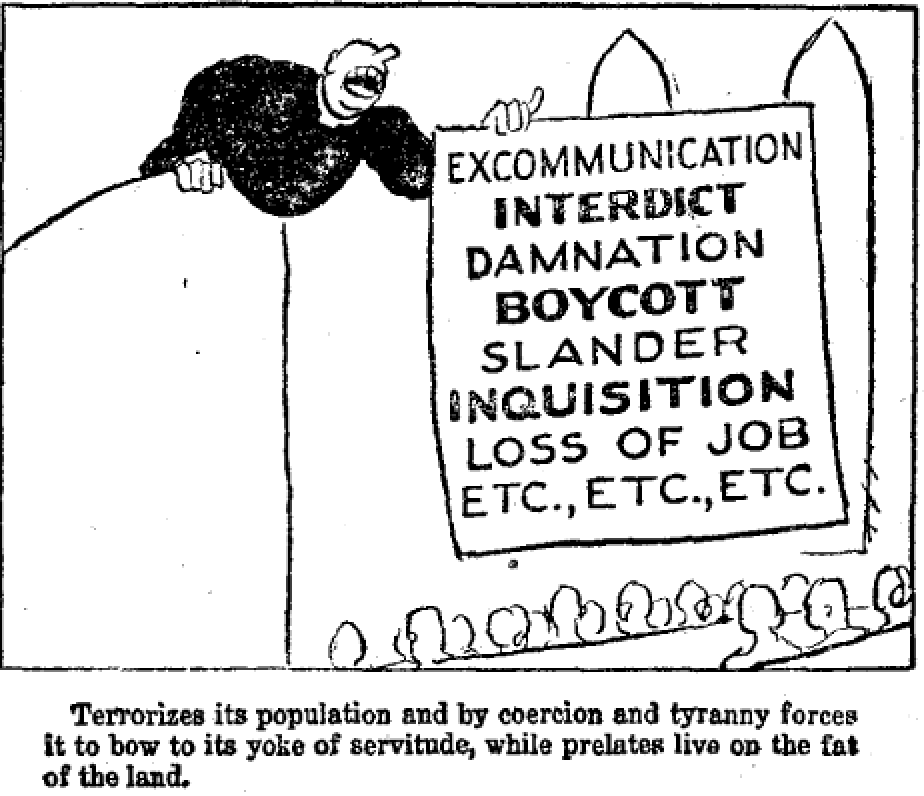
Image: Consolation 1937 Nov 3 p.21
It was described as mean and cowardly to excommunication people that may look at other religious opinions.
"Down in Goa the papers have carried notices that anyone having various books by Judge Rutherford would be excommunicated. What a bunch of mean and unmanly scallywags! Remember the blind man who was healed at the pool of Siloam, that when the man told the religious fellows where to get off they excommunicated him (John 9; 34, margin), and his parents before that had feared being put out of the synagogue by the "Jews". Isn't that the same cowardly action of the clergy in these days towards those who desire to have their eyes open and to "see"? "We'll excommunicate you!"" Consolation 1937 Nov 17 p.5
As late as 1947, the Awake January 8 page 27 described the practice of excommunication as an unscriptural, pagan practice, using Hebrews 10:26-31 to show it should be left to God to judge individuals.
Quite remarkably, it was in the years surrounding the above article that Knorr was setting up the disfellowshipping arrangement followed to this day.
In the Watchtower 1944 May 15 pp.151-152, responsibility to judge an individual was moved from the congregation to representatives of the congregation. Despite admitting Matthew 18 directs the entire congregation to decide if a person is a wrongdoer, this would change to involve a limited number of representatives, because the process described by Jesus in Matthew 18 "has served to cause more controversy and disruption among congregations in times past than almost any other thing."
In 1949, Counsel on Theocratic Organization For Jehovah's Witnesses was released, providing a brief outline of the process for spiritually qualified representatives to disfellowship an individual.
"If an individual associated with a company persists in wrongdoing and does not act according to the Scriptures as is becoming a Christian, then the representative members of the congregation who are the servants in the company, the mature ones or spiritually qualified, can decide what course should be taken. (Matt. 18:15-18) The Scriptural admonition is to have nothing to do with wrongdoers who seek to cause divisions. (Rom. 16:17; Titus 3:10,11) The mature brethren of responsibility would so advise the congregation, disfellowshiping the wrongdoer. (1 Cor. 5: 11-13) Later if genuine repentance is shown by the dismissed offender the responsible brethren may receive him back into their midst, and inform the congregation." Counsel on Theocratic Organization For Jehovah's Witnesses (1949) p.57
The turning point came in 1952, when Watchtower dismissed Jesus' remarks to refer a wrongdoer to the congregation, although with no explanation why.
"There is one more scripture quite pertinent here, at Matthew 18:15-17. ... This scripture here has nothing to do with disfellowshiping on a congregational basis. When it says go to the congregation, it means go to the elders or the mature ones in the congregation and discuss your own private difficulties. This scripture has to do with merely a personal disfellowshiping." Watchtower 1952 Mar. 1 p.147
The Watchtower 1952, March 1st edition was devoted to delivering clear guidelines on Watchtower's updated disfellowship policy, denouncing the disfellowshipped person in the strongest of terms.
"We might wonder, then, since this congregation which God is developing or bringing into existence is based on love, why anyone should ever want to talk about disfellowshipping or putting people out of this congregation. There certainly must be some reason. Well, the reason for disfellowshipping is that some persons get into this congregation of God that do not love Christ." Watchtower 1952 Mar 1 pp.131-132
"Such an individual has no place in the clean organization or congregation of God. He should go back to the wicked group that he once came from and die with that wicked group with Satan's organization." Watchtower 1952 Mar 1 p.134
"Those who are acquainted with the situation in the congregation should never say "Hello" or "Good-by" to him. He is not welcome in our midst, we avoid him." Watchtower 1952 Mar 1 p.141
This change was later justified as a result of worsening "moral corruption" following World War II.
"Even as early as 1904, the first president of the Watch Tower Society, in his book The New Creation, outlined a Scriptural procedure for dealing with violators, even to the point of withdrawing from them the congregation’s “fellowship and any and all signs or manifestations of brotherhood.” But this extreme measure of excommunication or disfellowshiping was not widely practiced among the congregations and was not made a requirement on congregations until 1952. No longer could Christian conduct be viewed simply as a matter affecting only the individual or individuals involved." Watchtower 1967 Oct 1 p.596
"During the years following World War II the moral corruption of the world began to reach frightful proportions. The possibility existed that God’s clean organization could become contaminated by such corruptive influences. But Jehovah was interested in his people, just as in times past, so through his channel of communication he lovingly brought forward information to counteract the filth that could tarnish or cause his people to become unholy. (Matt. 24:45-47) Particularly from 1946, personal moral cleanness became a matter of much greater concern to the Lord’s people. (2 Cor. 7:1) Starting in 1952, the more formal Scriptural arrangement of disfellowshiping wrongdoers was instituted. Those who committed gross sins such as adultery and fornication were expelled from the congregation, if they did not repent. (1 Cor. 5:11-13) God’s organization would not tolerate persons who refused to keep unspotted, clean and pure in the sight of Jehovah." Watchtower 1976 Feb 15 p.122
In the Watchtower 1955 Oct 1 p.607, even to associate with a disfellowshipped person became a reason to be disfellowshipped:
If a publisher refuses to do this and ignores the prohibition on associating with the disfellowshipped one, that publisher is rebelling against the congregation of Jehovah, and rebellion is as the sin of witchcraft, and stubbornness is as idolatry and teraphim. If after sufficient warning the publisher persists in associating with the disfellowshipped person instead of aligning himself with Jehovah's organization he also should be disfellowshipped.
The Elder's manual shows that associating with a disfellowshipped nonrelative continues as a disfellowshipping offence by including such association under the categorization of brazen conduct.
"Though this is not an exhaustive list, brazen conduct may be involved in the following if the wrongdoer has an insolent, contemptuous attitude made evident by a practice of these things:
Willful, continued, unnecessary association with disfellowshipped nonrelatives despite repeated counsel." Shepherd the Flock of God (2011) p.60
Members of the congregation are instructed to watch each other and alert the elders to any noticed indiscretions. With a degree of persuasiveness, members are told that the "Highest Level of authority" demands they even break their countries law to report on their brothers.
"This command from the Highest Level of authority in the universe put the responsibility upon each Israelite to report to the judges any serious wrongdoing that he observed so that the matter might be handled. While Christians are not strictly under the Mosaic Law, its principles still apply in the Christian congregation. Hence, there may be times when a Christian is obligated to bring a matter to the attention of the elders. True, it is illegal in many countries to disclose to unauthorized ones what is found in private records. But if a Christian feels, after prayerful consideration, that he is facing a situation where the law of God required him to report what he knew despite the demands of lesser authorities, then that is a responsibility he accepts before Jehovah. There are times when a Christian must obey God as ruler rather than men. Acts 5:29" Watchtower 1987 Sep 1 p.13
Since the introduction of disfellowshipping, there have been a number of changes in Watchtower doctrine and hence the reasons for being disfellowshipped have also changed back and forth. How can this occur if Jehovah directs an organization's rules? When a situation arises in a congregation that is not clearly specified in the Bible or a Watchtower publication and the elders and branch feel unable to deal with it this is referred to the Governing Body. How does the Governing Body arrive at a new principle for being disfellowshipped? Does the Holy Spirit guide them to examine scripture and arrive at a uniform consensus on what God's standard is? No, the vote does not have to be unanimous. New laws can be introduced with only a two-thirds majority vote.(6) For this reason both the regulation on organ transplants and oral sex was able to be changed back and forth within the space of little over a decade, with huge affect on member's lives.
For instance, the practice of smoking did not become a disfellowshipping offence until 1973. Having an organ transplant was an offence worthy of being disfellowshipped for over a decade, but is no longer viewed as wrong.
Oral or anal sex between married couples was classified as;
- a disfellowshipping offence - Watchtower 1974 Nov 15 p.704
- no longer an offence - Watchtower 1978 Feb 15 pp.30-32
- once again an offence - Watchtower 1983 Mar 15 p.31
One may hope that the draconian system of disfellowshipping would have eased over the years, yet the opposite is true. In 1974, there was a softening of the 1952 stance, with release of the following article, but this was short lived.
"Congregational elders, as well as individual members of a congregation, therefore, ought to guard against developing an attitude approaching that which some Jewish rabbinical writers fomented toward Gentiles in viewing them as virtual enemies. It is right to hate the wrong committed by the disfellowshiped one, but it is not right to hate the person nor is it right to treat such ones in an inhumane way.
...
We may note, too, that at 1 Corinthians 5:11 the apostle warns against mixing in company with one who "is" a fornicator or practicer of some other kind of serious wrongdoing. What, however, of the one who has been disfellowshiped for being that kind of person but who thereafter, either at an early point or at a later point in time, gives consistent evidence of discontinuing such wrong practice, stopping it? Can it be said that he or she still "is" a fornicator or whatever type of wrongdoer such a one was that caused him or her to be as "leaven" toward the congregation?
For example, a young person disfellowshiped for fornication may thereafter marry, raise a family and live a respectable life. Or one who was disfellowshiped for drunkenness may abandon such practice and, if drinking at all, may do so in moderation only. By such changes these individuals may now regain the respect of the community. Such ones may not yet have come and formally sought reinstatement by the congregation. Is there, however, not an evident difference between these and others who continue right on in the wrongdoing that brought their disfellowshiping? Those giving up the wrong practice may still manifest some appreciation for Christian truth, perhaps even defending the true Christian congregation when someone speaks evil against it. Should not such circumstances be given due weight and have an effect on our attitude as a congregation toward such ones?
Surely if the prodigal son of the parable had returned home in a drunken state, perhaps dragging along one of his harlot companions, the father's reaction would not have been the same. But the father had reason to believe that the son was approaching with a right motive and, rather than suspect the worst, the father hoped the best and went out to meet his errant son." Watchtower 1974 Aug 1 pp.467-469
Less than a decade later, this more reasonable stance reverted back to strict shunning with a comprehensive discussion on the topic in the Watchtower 1981 September 15 edition. The 1981 Watchtower continues to be the standard to be followed, referred to in publications such as the 2008 book Keep Yourself in God's Love.
Unscriptural Process
The process Jehovah's Witnesses follow for disfellowshipping strays from biblical principles in a number of areas.
Reasons not Mentioned in the Bible
There should always be clear Scriptural reason for disfellowshipping, and John reprimanded Diotrephes for attempting to throw people out of the congregation unnecessarily at 3 John 9-10.
Bible discussion of shunning by Paul and John is limited to just the following areas; Fornication, Greed, idolatry, Revilers, Practicing Drunkenness, Extortion and One who does not remain in the teaching of the Christ. Revelation 21:8 does not relate to shunning but at a stretch could be drawn on, and adds adultery, men kept for unnatural purposes, men who lie with men, thieves, cowards, those without faith, those disgusting in their filth, murderers, spiritism, and liars. This list should be the full extent of reasons for which to be disfellowshipped. The long list of Watchtower offences includes a number of practices never mentioned in regards to shunning, such as use of blood. However, the Watchtower goes even further. Common practices never specified in the Bible as sins have become grounds for being disfellowshipped. These include:
- Oral and anal sex
- Gambling - common throughout history, such as the casting of lots over Jesus clothing
- Use of Drugs such as marijuana - in common use in the first century
- Celebrations - Romans 14:1-18 specifically says not to judge anyone over the observance of days
If Jehovah wanted his followers to shun those for engaging in these common practices, the Bible would state so. Should the Society be creating disfellowshipping decrees beyond Bible offences? Of course not! Jesus condemned the Pharisees for creating thousands of laws for every situation, rather than promoting Godly principles and understanding the meaning of mercy. When a Pharisee expressed surprise that Jesus did not do ritual washing before dinner, Jesus' rebuke was particularly harsh.
Luke 11:42 "'But woe to YOU Pharisees, because YOU give the tenth of the mint and the rue and of every [other] vegetable, but YOU pass by the justice and the love of God!" (see also Matthew 12:1-10)
Matthew 12:7 "However, if YOU had understood what this means, I want mercy, and not sacrifice, YOU would not have condemned the guiltless ones."
If God spoke directly to the Governing Body as he did with the Apostles and they were infallible, then it may have authority to add to the scriptures. By their admission this is not the case. The Governing Body is not infallible and not inspired by God to write additional rules that do not appear in the Bible. For this reason the list should be based strictly on scriptures.
Further rules continue to be introduced, such as the Watchtower 2006 Jul 15 pp.29-31 explanation that "gross uncleanness" and "uncleanness with greediness" allows disfellowshipping to at times extend to heavy petting, sexual phone calls and viewing pornography.
Behind Closed Doors
In determining if a person should be disfellowshipped the elders form a "judicial committee" to meet with the wrongdoer. This is done in private, and the wrongdoer is not allowed an onlooker, lawyer or recording device.
"Hear only those witnesses who have relevant testimony regarding the alleged wrongdoing. Those who intend to testify only about the character of the accused should not be allowed do so. The witnesses should not hear details and testimony of other witnesses. Observers should not present for moral support. Recording should not be allowed." Shepherd the Flock of God p.90
This star-chamber setting opens the procedure to abuse.
"I cannot tell you how humiliating and degrading it is as a woman to sit before 3 men (1 that I had known my whole life) and have to describe in graphic detail what I had done sexually that was sinful." - Email from reader
The word "judicial committee" does not appear in the Bible and goes against Bible guidelines. Both the Israelites and early Christian congregations kept matters open to ordinary persons. Rather than being done in private, in front of elders only, matters were held by Israelites at the city gates so a fair discussion with onlookers could be made, or in front of the Christian congregation. This prevented the injustice that can take place before small closed bodies of elders.
"The Bible regulations and accounts indicate that cases of wrongdoing came before the city elders at the gates primarily when controversies were involved, as in cases where an offender would not acknowledge having wronged another, and also when the community as a whole was seriously affected or endangered by the wrongdoing." Watchtower 1976 Dec 1 p.732
"Since the local court was situated at the city gates, there was no question about the trial being public! (Deut. 16:18-20) No doubt the public trials helped influence the judges toward carefulness and justice, qualities that sometimes vanish in secret star-chamber hearings." Watchtower 1981 Jan 1 p.17
At Matthew 18:17, Jesus instructed that unresolved wrongdoing should be taken "to the congregation", not a select committee of congregation leaders. This is how misdemeanors were originally dealt with. As discussed above, the judicial committee arrangement was not inaugurated until 1944 by Knorr.
Reasons hidden
When the person was disfellowshipped or publicly reproved the congregation was to know why. Paul openly told the congregation of the wrong conduct of Peter, Hymenaeus, Alexander and Diotrephes. To avoid legal problems, the Society does not follow this Scriptural advice. The extent of both the disfellowshipping and disassociating announcement is restricted to:
"[Name of person] is no longer one of Jehovah's Witnesses." Organised to do Jehovah's Will (2005) p.154
Speed of process
In the scriptures it makes no mention of a time limit over which the process must take place. It does indicate that quite some period of time may be involved;
Galatians 6:1 Brothers, even though a man takes some false step before he is aware of it, YOU who have spiritual qualifications try to readjust such a man in a spirit of mildness, as you each keep an eye on yourself, for fear you also may be tempted.
To readjust a brother could take considerable time. If a person is addicted to certain practices or if they are having doubts about doctrine it could take months of effort to overcome these.Yet in many cases when a Jehovah's Witness confesses or another person reports their activities to the elders they are disfellowshipped within a few weeks. Furthermore, if the process is to readjust someone, it implies the person would not be disfellowshipped in the event the offender is readjusted and quits his ways, such as after taking blood or stopping an adulterous affair. Yet the general practice in these cases is automatic disassociation or likely disfellowshipping.
Punishment
Shunning was to be used for readjustment or to protect the congregation. However it is regularly used as punishment. When a person confesses to a wrong practice committed and ceased many years ago they have often been disfellowshipped for a wrong attitude, which is clearly done for punishment.
Overly Harsh
A review of Insight on the Scriptures, Volume 1 p.788 Expelling shows that many scriptures that relate to wrongdoing discuss assisting or reproving the person.
2 Corinthians 2:5-8 "Now if anyone has caused sadness, he has saddened, not me, but all of YOU to an extent not to be too harsh in what I say. This rebuke given by the majority is sufficient for such a man, so that, on the contrary now, YOU should kindly forgive and comfort [him], that somehow such a man may not be swallowed up by his being overly sad. Therefore I exhort YOU to confirm YOUR love for him."
Persons are so traumatised by being disfellowshipped and shunned that it is common to suffer post traumatic shock disorder, suicidal ideation and even suicide. Awake! 1983 5/22 p.15. quoted Psychology Today as saying "I know of no more potent killer than isolation ... It has been shown to be a central agent in the ethology of ... suicide..." When Watchtower says it is necessary to disfellowship and "isolate a spiritually sick individual from the congregation" (w21 Oct p.10) it knows the potential consequences.
Pharisaic
Since the word disfellowship does not appear in the Scriptures, the New World Translation Reference Bible "Bible words indexed" directs the reader to the term "expelled".
"DISFELLOWSHIP(PED). See EXPEL, EXPELLED"
Rbi8 p.1507
Under Expelled the Scriptures are
"EXPELLED,
Joh 9:22 e. from synagogue
Joh 12:42 not to be e. from synagogue"
Rbi8 p.1510
Both references are regarding the Pharisees practice of expelling from the Synagogue.
John 9:22 "His parents said these things because they were in fear of the Jews, for the Jews had already come to an agreement that, if anyone confessed him as Christ, he should get expelled from the synagogue."
The closest Scriptural example the Watchtower can find for the term disfellowship is that of the Pharisees.
Hatred
The direction given in the Watchtower goes strongly against Christian examples when demanding members hate an apostate.
"The obligation to hate lawlessness also applies to all activity by apostates. Our attitude toward apostates should be that of David, who declared: Do I not hate those who are intensely hating you" Watchtower 1992 Jul 15 pp.12-13 Christ Hated Lawlessness Do You?
"Apostasy is, in reality, a rebellion against Jehovah. Some apostates profess to know and serve God, but they reject teachings or requirements set out in his Word. Others claim to believe the Bible, but they reject Jehovah's organization and actively try to hinder its work. When they deliberately choose such badness after knowing what is right, when the bad becomes so ingrained that it is an inseparable part of their makeup, then a Christian must hate (in the Biblical sense of the word) those who have inseparably attached themselves to the badness. True Christians share Jehovah's feelings toward such apostates; they are not curious about apostate ideas. On the contrary, they "feel a loathing" toward those who have made themselves God's enemies, but they leave it to Jehovah to execute vengeance."Watchtower 1993 Oct 1 p.19
Jesus and Paul both said we should not hate but rather love our enemies. This was to apply even when someone is attacking our faith and practice.
Matthew 5:44-45 "But I say to you, love your enemies, bless those who curse you, do good to those who hate you, and pray for those who spitefully use you and persecute you, that you may be sons of your Father in heaven; for He makes His sun rise on the evil and on the good, and sends rain on the just and on the unjust,"
Romans 12:17-21 17 Return evil for evil to no one. Provide fine things in the sight of all men. 18 If possible, as far as it depends upon YOU, be peaceable with all men. 19 Do not avenge yourselves, beloved, but yield place to the wrath; for it is written: Vengeance is mine; I will repay, says Jehovah. 20 But, if your enemy is hungry, feed him; if he is thirsty, give him something to drink; for by doing this you will heap fiery coals upon his head. 21 Do not let yourself be conquered by the evil, but keep conquering the evil with the good.
When discussing a person seduced by apostasy Paul said at 2 Thessalonians 3:15 And yet do not be considering him as an enemy, but continue admonishing him as a brother.
When discussing that for everlasting life it is necessary to love your neighbor as yourself, Jesus used the illustration of the Good Samaritan to explain who ones neighbour is. (Luke 10:25-37) The Jews regarded the Samaritans as apostates of the Jewish religion, yet Jesus says our love is to encompass these people as well.
Baptized without understanding
Since 1985 the second Jehovah's Witness baptism vow became;
"(2) Do you understand that your dedication and baptism identify you as one of Jehovah's Witnesses in association with God's spirit-directed organization?" Watchtower 1985 Jun 1 p.30
At baptism a person commits themselves to the Watchtower Organization, despite the word organization never appearing in the Bible. Few realise that they have committed their bedroom lives, work choices and life long relationship with family and friends to the Organization. Terms such as ecclesiastical government of Jehovah's Witnesses are never used in the Watchtower publications that are issued to the public, but are terms used within confidential letters to branches and the elders. Would as many people be baptised if they realised it was not only to Jehovah, Jesus and the Holy Spirit that they were being baptised but to an ecclesiastical government that had the right to introduce any rule at any time?
When a person is baptised, very few have even an inkling of the true history of the religion. No person that gets baptised has any idea of the full list of things that they could be disfellowshipped for as this list is unattainable, and many of the reasons are not clearly specified in the Bible. Most of the reasons are scattered through various Watchtower publications, but a newly interested one is rarely shown all of these. Neither do the Watchtower publications contain a full list of reasons for being disfellowshipped. Even people involved in the organization for years are generally unaware of all the reasons. In regards to disfellowshipping, Pay Attention to Yourselves and to All the Flock states on page 101 that elders should be sure to proceed "in harmony with the most recent statements by the Society."
Only elders have access to Pay Attention to Yourselves and to All the Flock and letters from the Society. In 2010, a updated Elder's book - "Shepherd the Flock of God" - was released. Seven of its twelve chapters are devoted to disfellowshipping. A Letter to Elders, Oct 7, 2010 shows how secretive this book is, when it says women are not allowed to bind the book, even under supervision:
"There is no objection if an elder personally spiral binds or laminates his own textbook or does so for other elders. If he has another baptized brother who is not an elder do the work for him, the elder must watch while the work is being done. Outside companies, unbelievers, or sisters are not permitted to do this work. The material in the book is confidential, and confidentiality must be preserved."
Likewise, Letter to Elders, August 23, 2010 states:
"The information is designed for use by the elders only, and other individuals should not have any opportunity to read the information."
Even elders do not get to know the guidelines for all situations, as more difficult scenarios are discussed in letters specifically to the Bethel Branches. Most people are baptised with no knowledge that these books and letters even exist, let alone know what is contained in them.
How much information did Jesus provide the Apostles that he forbade sharing with anyone else? A religion that disfellowships and shuns should be transparent with providing full access to information regarding these rules prior to a persons involvement, rather than hiding it even from long term members.
Minors
Jehovah's Witnesses baptise minors, which is disturbing considering baptised minors can be disfellowshipped and shunned. There are enough disfellowshipped children to warrant a 2013 "Questions From Readers" article discussing the topic "Would it be appropriate for Christian parents to sit with a disfellowshipped child at congregation meetings?" (w13 8/15 p. 8). The following quotes go into further detail on disfellowshipping and shunning minors.
"When a baptized minor becomes involved in wrongdoing that threatens the cleanness of the congregation, the assigned committee should meet with such individual just as they would with any other member of the congregation." Pay Attention to Yourself and to All the Flock p.98
"If your child is unrepentant and is a baptized Christian, he may receive the strongest form of discipline - being disfellowshipped from the congregation. The extent of contact that you will then have with him depends on his age and other circumstances.
If the child is a minor and is living at home, you will naturally continue to take care of his physical needs. He also requires moral training and discipline, and you have the responsibility to provide these. (Proverbs 1:8-18; 6:20-22; 29:17) You may want to conduct a Bible study with him, involving his direct participation. You can draw his attention to various scriptures and to the publications provided by the faithful and discreet slave. (Matthew 24:45) You can also take the child with you to Christian meetings and have him sit with you. All of this can be done in hopes that he will take Scriptural counsel to heart.
The situation is different if the disfellowshipped one is not a minor and is living away from home. The apostle Paul admonished Christians in ancient Corinth: Quit mixing in company with anyone called a brother that is a fornicator or a greedy person or an idolater or a reviler or a drunkard or an extortioner, not even eating with such a man. (1Corinthians 5:11) While caring for necessary family matters may require some contact with the disfellowshipped person, a Christian parent should strive to avoid needless association.
When an erring child is disciplined by Christian shepherds, it would be unwise if you were to reject or minimize their Bible-based action. Siding with your rebellious child would not be providing any real protection from the Devil. Actually, you would be endangering your own spiritual health. On the other hand, by supporting the efforts of the shepherds, you will remain solid in the faith and will provide the best help for your child." Watchtower 2007 Jan 15 p.20 Remaining Steadfast When a Child Rebels
Those raised as Jehovah's Witnesses are most commonly baptised as teenagers, though pre-teenage children can also be be baptised.
"In the summer of 1946, I was baptized at the international convention in Cleveland, Ohio. Although I was only six years of age, I was determined to fulfill my dedication to Jehovah. That summer I served as a pioneer for the first time." Watchtower 1992 Mar 1 p.27
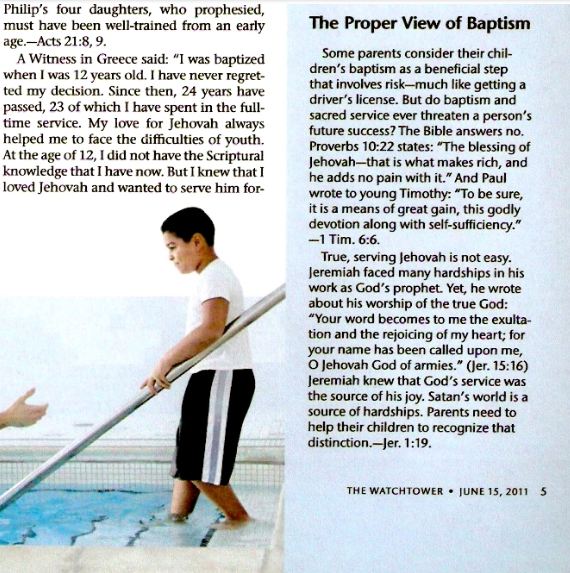
Watchtower 2011 Jun 15 p.5
From that point forward they are subject to the rules of disfellowshipping, and can remain so for the rest of their lives.
Watchtower considers baptism a binding verbal contract. As such, baptising minors should be considered illegal. Laws protect the rights of minors, and provide guidelines to prevent entering contracts. A child's knowledge and ideas change dramatically between their teens and twenties. The brain does not finish development until around 25. For this reason, minors are legally restricted from consuming alcohol, voting, joining the army or marrying.
Child baptism is Scripturally wrong. Never is the baptism of a minor mentioned in the Bible. Jesus was not baptised until he was 30, as this was considered the age Jewish people were considered an adult and there is no Scriptural evidence of any children or teenager being baptised. When Cornelius and his family were baptised, there is no mention of minors being baptised
Shunning a person that was baptised as a child is illogical. If a person is raised as one of Jehovah's Witnesses and does not get baptised, they can be associated with regardless of their beliefs and actions as an adult. Yet a child baptised at the age of 10, an age too young to make an informed commitment, will be shunned for the very some beliefs and actions if disfellowshipped. This is a double standard that shows the hypocrisy behind shunning.
Family
The New Testament never specifically extends shunning to immediate family members. Rather Paul stated at 1 Timothy 5:8;
"Certainly if anyone does not provide for those who are his own, and especially for those who are members of his household, he has disowned the faith and is worse than a person without faith."
Forcing followers to shun their own parents, children and siblings should be proof to anyone that Jehovah's Witnesses are a dangerous religion.
A former Jehovah's Witness recalls:
"I was told that I could not speak with my own daughter due to sins for which she had been disfellowshipped, levelling an idiotic assumption that I was not mature enough to resist the potential gravity of her sinful life, and needed protection. For God's sake - she had sex without being married - nothing more or less. She was no danger to me or my integrity. And I was her father, the one she was supposed to turn to at times of need. At the time she needed the most support to get over 'normal human adolescent confusion and hormonal overkill' I was supposed to treat her as if she was 'dead'."
Reinstatement Procedures
The following 17 minute recording was taken by a girl attempting to be reinstated, and highlights the procedure well. It starts slowly, but is quite heartbreaking at the end. You will probably agree with the girl's comment regarding the elders lack of heart.
If your browser does not support this audio element, download as a MP3 8.4Mb, WAV 16.4Mb, or OGG 8.7Mb.
In the parable of the prodigal son Jesus outlined the type of love the Father has for us and that we should show each other. (Luke 15:11-32) The youngest child of a rich family spent years squandering his inheritance living a life involved in numerous contemptible sins. Jesus showed that despite this, on seeing his son return home the aged father ran to his child with open arms. He did not wait to question the sons current actions, did not attempt to determine his sons motives and repentance, nor give him a period of lower status as punishment.
Nowhere in the Bible does it discuss a detailed process for reinstatement, nor give a timeframe in regards to how long before reinstatement can take place. Paul simply stated that a person who is a wrongdoer should be avoided. When they are no longer practicing the wrongdoing there is no reason to keep shunning them. The Watchtower however requires a formal reinstatement process through the body of elders.
"To be forgiven and reinstated, however, he must humbly obey God’s laws, produce fruits befitting repentance, and apply to the elders for reinstatement." Watchtower 1992 Sep 15 p.12
The Watchtower specifies a period of time to pass, even though acknowledging the Christian example allows for shorter periods.
"If these necessary evidences of sorrow and change are present, then his reinstatement could be considered by the congregation committee after sufficient time had elapsed, which in most cases is at least a year." Watchtower 1963 Aug 1 p.473
"Although it seems that the wrongdoer in Corinth was reinstated within a relatively short period of time, this is not to be used as a standard for all disfellowshippings." Watchtower 1998 Oct 1 p.18
Though the scriptures give no legalistic approach to determine when a wrongdoer is to be associated with, the Watchtower Society has developed a formalistic procedure for determining if a person is worthy of having their disfellowshipped status removed. They must attend meetings regularly for several months whilst being shunned before an application for reinstatement will be considered. After this they must be examined by the elders to determine if they have ceased the wrongdoing and have a repentant attitude. Once this is determined, a public announcement is made. Only after this procedure and announcement are family members and others within the congregation free to talk to that person.
Take the fairly common example of an engaged couple that commit fornication in the weeks prior to their wedding. If discovered they may be disfellowshipped. Once married they are not immediately reinstated as time is made to pass before their request for reinstatement will be considered. They then are forced to go through the formal process of being deemed repentant. Yet on the day of their marriage they are no longer fornicators as they are scripturally married. There is no scriptural reason they should no longer be associated with. That they are not automatically and immediately reinstated indicates that the Witness practice is based on punishment. This punishment extends for some months after their reinstatement until the elders determine they are worthy to once more participate at meetings.
Likewise, many are disfellowshipped as teenagers for drunkenness, smoking or immorality. Over the years they stop this behaviour, possibly marrying and having children. Scriptural principles show that since they are no longer practicing wrongdoing and are not known in the community as a brother it is acceptable for them to be spoken to. On the other hand, Watchtower legislation dictates they must not be spoken to until they resume meeting attendance, apply for reinstatement, are approved and then had a public announcement made. For a high percentage of those raised as Jehovah's Witnesses there is no desire to return to the Watchtower Organization and so this process is never initiated, meaning their family relationship is damaged for the remainder of their lives.
Once reinstated more rules have been created to outline what activities they may participate in. Over time they will be allowed to resume field service, then answering at meetings, then giving talks. It will be several years before they finally are in line for privileges such as pioneering or being considered a Ministerial Servant. The Bible writers gave no such rules.
"Restrictions should be imposed to help the person see the need of continuing to make 'straight paths for his feet' and also out of consideration for the congregation's conscience." Pay Attention to Yourselves and to All the Flock p.131
Sharing in the field service is restored when the individual is reinstated. Other privileges, such as commenting at meetings, handling parts on the program, and offering prayer at meetings, can be restored progressively when it is determined that the individual has progressed spiritually to the point that he is qualified and when it is judged by the elders that the extending of such privileges will not be offensive to the congregation.
"A full year must have passed from the time a judicial reproof was given or since reinstatement following disfellowshipping before one could be considered for auxiliary or regular pioneer service." Kingdom Ministry 1986 Aug p.6
"If at one time a person had been disfellowshiped or disassociated, may he ever give a public talk? This might occur, but only after at least ten years from reinstatement. (For details see The Watchtower, 8/15/65, p. 497; Lamp, p. 121.)" Kingdom Ministry 1970 Dec p.4
Data Retention
Disfellowshipped people are tracked until they die, with records being kept by their congregation and the Branch Office, as outlined in a 2015 Elder's letter.
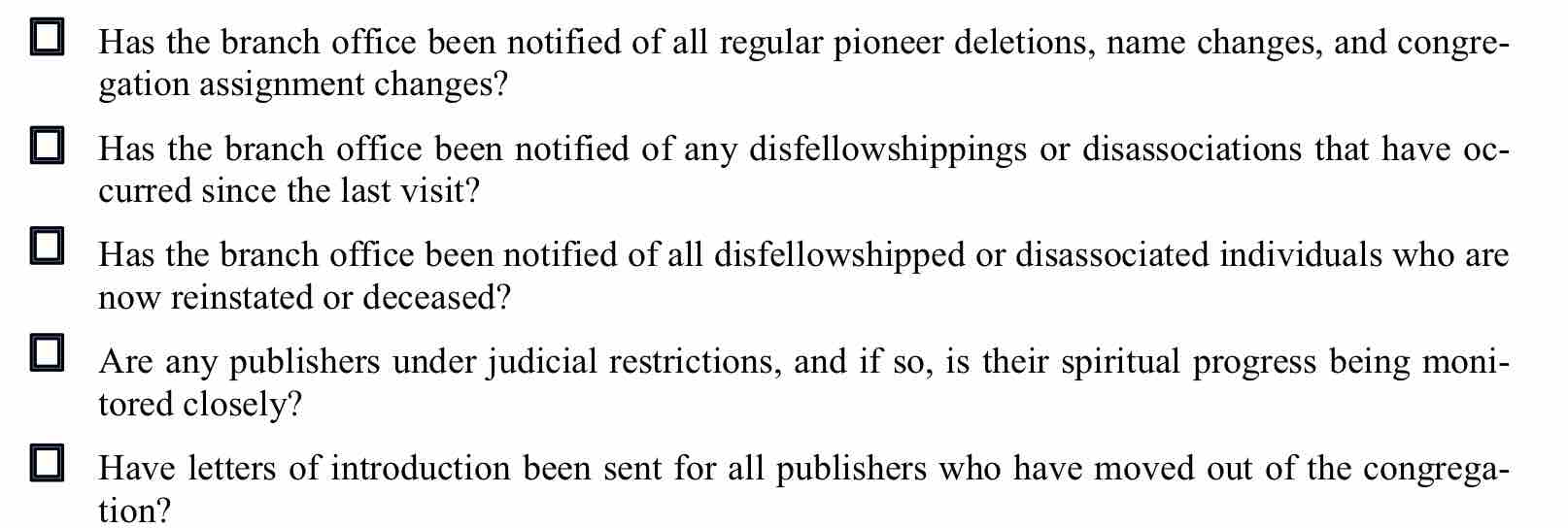
2015 Information Needed for Visit of Circuit Overseer - Elder's Letter
As of 2021, the Disfellowshipping form is called S-77-E 7/21 RECORD OF DISFELLOWSHIPPING, DISASSOCIATION, OR JUDICIAL REPROOF. It outlines that "The committee should send the completed form to the Service Department and retain a copy for the congregation’s confidential file." The congregation is instructed to retain a copy for the "the retention period ... ." The Shepherd Addendum outlines that the retention period for the congregation is 20 years. It does not outline the retention period for the Service Department.
Conclusion
With many religious groups, when a person no longer follows their moral guidelines or beliefs, they drift away from Church and associate with like-minded individuals outside the congregation. This is how it is for Jehovah's Witness youths that did not get baptised; they simply leave over time, but are able to enjoy occasional family association. Yet for youths baptised as innocent and unsuspecting teens, the threat of disfellowshipping is traumatic, regardless of whether it coerces them to remain a Jehovah's Witness against their will, or leave and lose all those they love.
Hundreds of thousands of Witnesses are currently disfellowshipped and estranged from their families and friends. The disfellowshipping process causes trauma, and Jehovah's Witnesses are often disfellowshipped at a time when they most need help from others.
Not all Jehovah's Witnesses strictly follow the Watchtower guidelines, but those that continue contact with disfellowshipped family or friends conceal such association for fear of being disfellowshipped themselves.
Watchtower recognises that shunning is a form of retaliation and manipulation when discussing marriage.
"Retaliation. Some spouses use silence as a form of revenge.
Manipulation. Some use the silent treatment as a means to get what they want." Awake! 2013 June "How to End “the Silent Treatment”"
It is equally the case that disfellowshipping and shunning religious members is used as a form of punishment and control.
Watchtower claims love is one of its distinguishing factors and that Jehovah's Witnesses are a loving brotherhood. One of Jesus' greatest commands was to show love to one's brother and to one's neighbour (Luke 10:27). The doctrine on disfellowshipping puts serious question marks over any claim of love that Jehovah's Witnesses attempt to make. Total alienation from this brotherhood and being cast into the world builds fear of removal. Comparison between Bible guidelines for association with former members and Watchtower policy on disfellowshipping and shunning shows the Organization has gone beyond the Scriptures as a means of control.
Watchtower attempts to present shunning as loving and necessary, using 3 primary reasons.
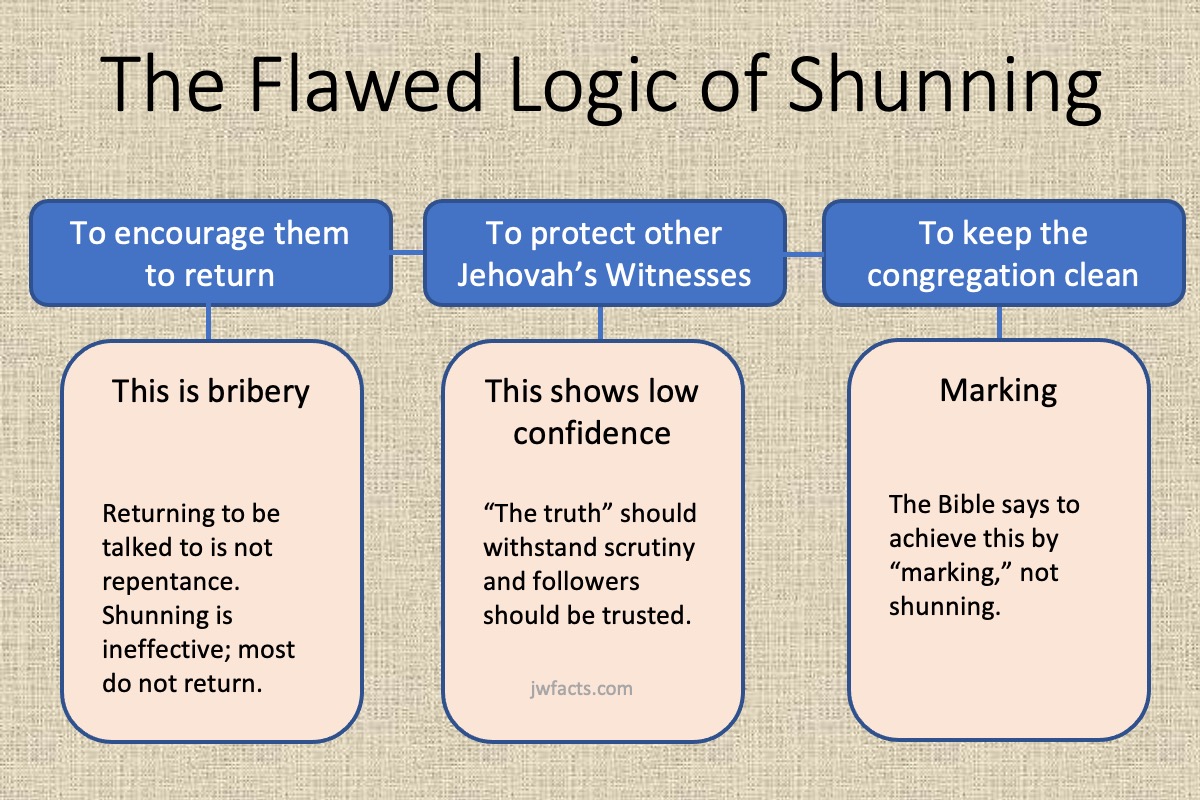
Whilst the Bible never mentions disfellowshipping, it does talk about “marking” a wrongdoer. People that are not Jehovah’s Witnesses are treated this way. They are not shunned, but association is limited and care is taken not to become involved with the lifestyle and beliefs they promote. By going beyond this with the disfellowshipping arrangement, Watchtower is manipulating people through coercion.
The good news is that the number of people leaving Jehovah's Witnesses continues to rise, leading to the reuniting of family members. I have seen this firsthand amongst my own friends. When a person realises Watchtower teachings are wrong, the first contact with family they have been shunning brings both overwhelming joy and shame. The emotion in the following video is incredibly moving, visible in the photo of a brother and sister that were prevented from speaking to each other for 10 years.
Footnotes:
(1) Watchtower wrote, "In recent years disfellowshippings worldwide have been approximately 1 percent of publishers." (w92 7/1 p.19.) The following Watchtower articles provided figures for the number disfellowshipped - w60 12/1 p.728; yb79 p.31;w86 1/1 p.13;w87 9/15 p.13; w89 12/1 p.17;w91 11/15 p.9 - which when compared with average publisher numbers was slightly over 1%.
Statistics provided in Watchtower 1974 Aug 1 p. 466 and Watchtower 1960 Dec 1 p.728 indicate that the number reinstated each year is only 1/3 of the number disfellowshipped.
Applying those percentages to average publishers show that in the 30 year period from 1991 to 2020 over 1.3 million Jehovah's Witnesses were disfellowshipped. After taking into account those that have died, there are over one million people currently labelled as disfellowshipped and shunned.
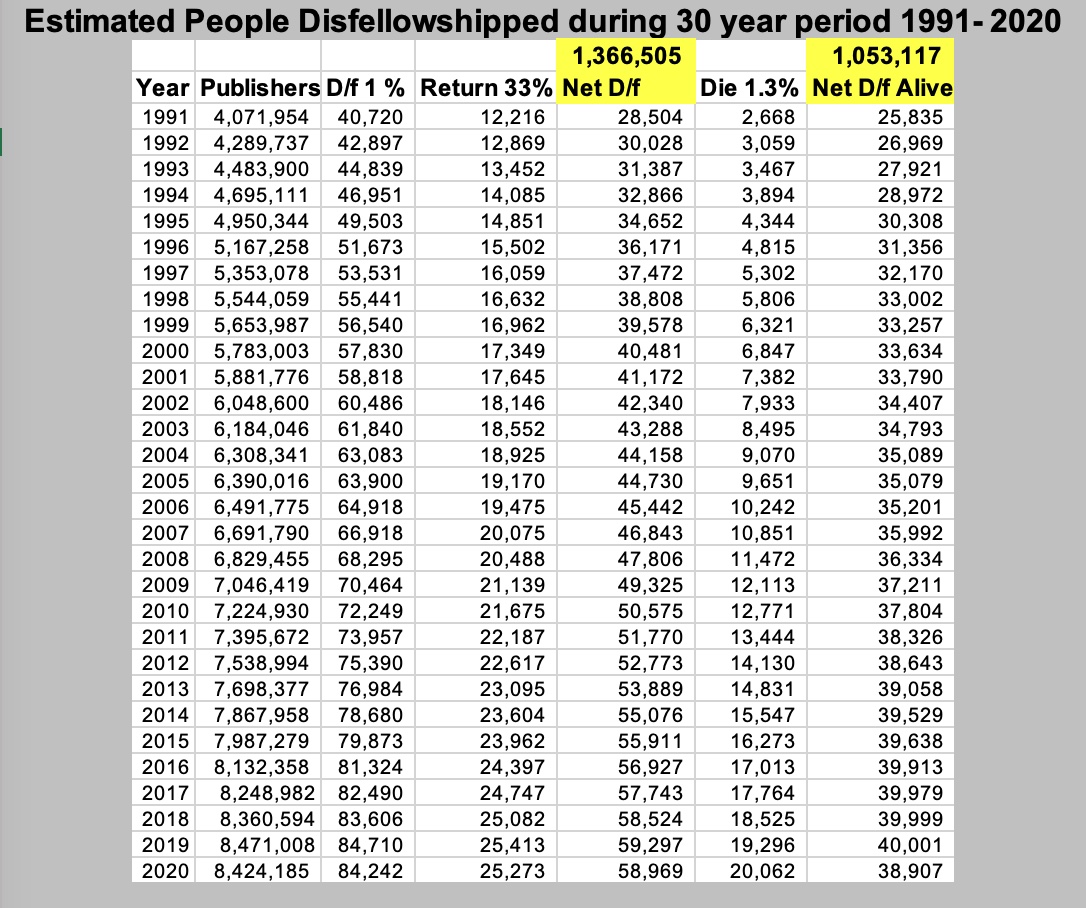
(3)"Disfellowshiping means the casting of a member out of Gods household; and if one should remain in this disfellowshiped condition till he died, it would mean his everlasting destruction as a person who is rejected by God. Staying away from meetings leads in that very direction." Watchtower 1965 Dec 15 p.751
(4) When a person is marked they are not named and are allowed to continue contact with others. Only those who specifically know of the person's wrongdoing are advised to stop associating with the person socially, but may still speak to them at the meetings.
(5) Disassociation is generally used for a Witness that voluntarily removes themselves from the congregation. For the sake of this article, disfellowshipping and disassociation will be considered the same, as the implications to the individual are almost identical, in both cases leading to shunning. Organized to Accomplish Our Ministry (1972) states;
"The term disassociation applies to the action taken by a person who, although being a baptized member of the congregation, deliberately repudiates Christian standing, rejecting the congregation and stating that he no longer wants to be recognized or known as one of Jehovah's Witnesses. … Also, a person might renounce his place in the Christian congregation by his actions, such as by becoming part of a secular organization the objective of which is contrary to the Bible and, hence, is under judgment by Jehovah God. (Compare Revelation 19:17-21; Isaiah 2:4.) So if a person who is a Christian chooses to join those who are disapproved by God, it would be fitting for the congregation to acknowledge by a brief announcement that he has disassociated himself and is no longer one of Jehovah's Witnesses. Such a person would be viewed in the same way as a disfellowshipped person."
(6) "At a session three weeks later, April 30 [1975], President Knorr surprised us by making a motion that thenceforth all matters be decided by a two-thirds vote of the active membership (which by then numbered seventeen)." Raymond Franz, Crisis of Conscience (Commentary Press Fourth Edition 2004) p.85.
The effect of requiring a 2/3 majority is discussed in Franz's book In Search of Christian Freedom. Click Here for a scan of the relevant pages.
Experiences of Disfellowshipped People
The Last Night
Mum brought my brothers and sister over to my apartment the Thursday they were to announce my disfellowshipping. We made small talk and laughed like we always did and then she cleared her throat. It's a very distinct throat clearing that we all recognize. It means she's upset and about to say something important. A stillness came over the room. Everyone grew uncomfortable and their smiles quickly dissipated. She then lined up the family and told them to say good-bye to me because we wouldn't see each other again for a very long time. They each, one by one, hugged me uncomfortably with confused looks on their faces. Emily was 9, Chad 11, Michael 17. I remember Emily quietly sobbing and clutching my skirt with her little chubby fingers at one point, as Mom went on about how I had a choice and this is what I chose. I had been looking down during this speech and focused on Emily's fingers. She wore glitter nail polish and had a smiley face drawn on her left thumb by her friends at school earlier that day.
Afterwards, she sent them to the car and said, "I love you, Rebecca. And, I'll be waiting for the day you come back. When that day comes, I'll welcome you with arms wide open just as the prodigal son was joyously received by his father. I'll say, 'This daughter of mine was dead, but has now returned to life. She was once lost, but now is found.' And, then we will have a huge party celebrating your return, but until then you are exactly as the Scriptures say ... You are dead to me. You made a promise to Jehovah on June 13, 1995 and dedicated your life to serving him; today you have decided to turn your back on God." She then kissed my cheek and walked out the door.
I stood there at the front door with those words ringing in my ears, "Turned your back on God... Dead to me." Slowly, I crumpled to the floor sobbing. I kept replaying all of it over and over in my head... their solemn faces, the coldness in mom's voice. And, then I thought back to those little glitter nails... the hand drawn smiley face. I went back to before the lecture, to the first 15 minutes when we laughed and made small talk. It was the last normal moment I ever had with my family. I drug myself to bed and finally fell asleep thinking of those 15 minutes of laughter and that smiley face on Emily's thumb.
I Have My Sister Back
My sister has been disfellowshipped for well over a decade. At that time, I was busy wooing my wife-to-be, and very busy with starting a life of my own. I shunned her completely just like I was supposed to. She wasn't even invited to my wedding.
At first, I felt self-righteous in shunning her. As the years have gone by, I have become increasingly aware of all that is being missed. She has a family that I don't know. A life that I'm not a part of. She has never met my children. My kids dont know this Aunt and Uncle and Cousin. This awareness has become more and more heavy, and has turned into a sense of guilt and remorse. How could I turn my back on my own sister?
I couldn't waste any more time. This weekend I found her through google. I sent an email, just hoping that it would reach her.
And today, she replied! We are going to talk soon. We have so much to catch up on! I don't even know where to begin. Actually, I do know where to begin.
It will begin with an apology.
The Walk of Shame
It all starts after you hear "these things we pray through Jesus Christ, Amen".
I gather my books and the kid's books and put them away. By that time people are walking over to us and talking to my wife and playing with my kids. They will talk to her about the weather, the meeting, her pregnancy or anything. Do they ask about me? No. Do they talk to me? No. Not only will they not talk to me, they don't even acknowledge my existence with a nod, a smile or even eye contact. See, I'm dead to them. Who are these people? Well, they are ones who claimed to be my best friends, my spiritual brothers, people who loved me, well, only until 3 men judged me as a sinner worthy of death, now I suppose I'm not worthy of even a "hello" from them. Screw 'em. I stay at my seat for a while because with a 2 1/2 year old and a 4 1/2 year old my wife needs help keeping an eye on the kids. After a short while I just can't take it anymore. Thus the walk of shame begins. I navigate my way through the forest of people all the while noticing people....not noticing me (or at least pretending not to). I walk right past a friend of mine who doesn't even look at me even though over the summer we sat on my patio after putting up a fence and shared a six pack and played with my dog. Then there are the elders, the Shepherd's of the flock that see a sheep having trouble and offer no help, again not even a glance. Then the real hurt and anger hits. I see little kids, most of who play with my son and daughter. They won't even say hi to me. These are otherwise innocent little kids who know they can't talk to "that man". I get my coat on and walk out the door, I go to the car to sit and stare at the night sky wondering if I am indeed the kind of person that deserves this type of treatment.
Thanks for reading, I just needed to vent. It's been about 2 months or so since my DF announcement and it's just getting hard to do the walk of shame 3 times a week.
Out of the Mouth of Babes
A grandmother has not seen her six year old grand daughter for 18 months because her son is disfellowshipped. The six year old made the following comment to her mother.
"I think it was people who just made that (shunning) up and not God because I don't think he would do something such a nuisance. If you're in that religion when I'm a grown up and can't come to see me, I will still come to see you."
What sort of religion makes children think their mother may not want to see them?
Text from Sister
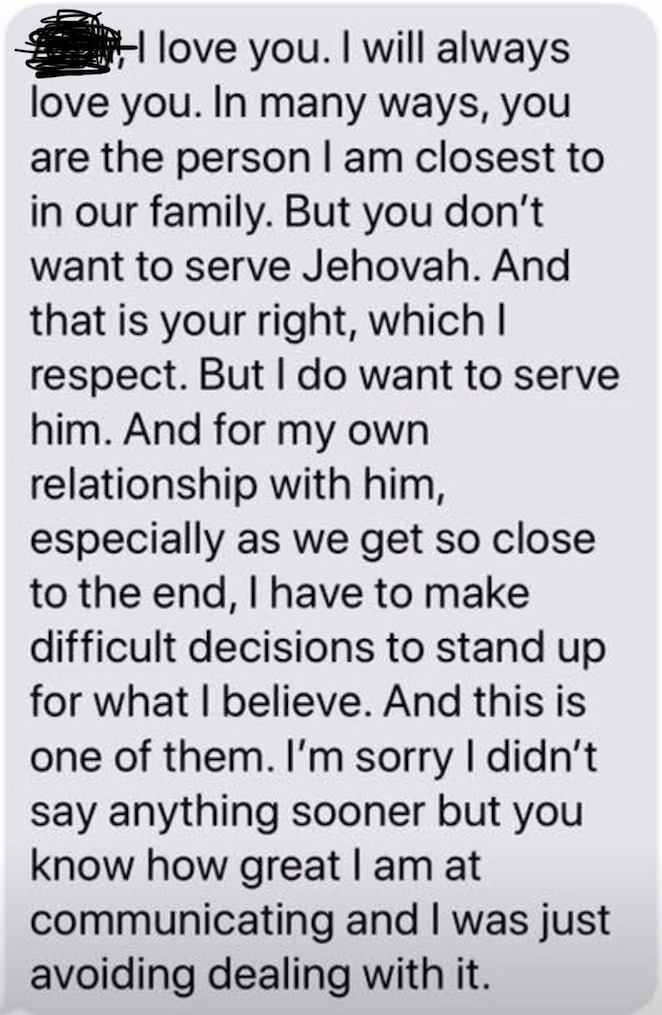
Additional Experiences
For additional experiences that show the illogical and counter productive nature of disfellowshipping see:
Disfellowshipped Wife
Mother of Disfellowshipped Children
Short Shunning Experiences
Shunning as practiced by similar high control groups
Shunning is common in high control groups, and is listed as one of the key factors to be aware of when determining if a religious group is manipulating members through coercive persuasion. For example, Steven Hassan includes it in this BITE model, used to determine destructive groups. Watchtower application of disfellowshipping is one of the more extreme in Christianity and emulates behavioural characteristics common amongst high control groups such as Mormons, Scientologists, Exclusive Brethren and Amish.
Scientology
"Disconnection" is a Scientology practice of cutting all ties and all communication with someone who is declared a Suppressive Person (evil) by the Church of Scientology. This may include family, friends, loved ones, work associates, acquaintances, or anyone else found Suppressive by the Church.Disconnection is a very touchy topic among Scientologists and critics both. Scientologists believe that Disconnection is generally a necessary action that, when undertaken, benefits the group as a whole. Critics believe this is an extremely harmful practice akin to emotional blackmail that destroys families and interpersonal relationships. (http://www.exscientologykids.com/disconnection.html Sept 28 2008)
Latter Day Saints (Mormons)
"... the church's Web site lists the following reasons for convening a disciplinary council: " abortion, transsexual operation, attempted murder, rape, forcible sexual abuse, intentionally inflicting serious physical injuries on others, adultery, fornication, homosexual relations, child abuse (sexual or physical), spouse abuse, deliberate abandonment of family responsibilities, robbery, burglary, theft, sale of illegal drugs, fraud, perjury, or false swearing."
In addition, "disciplinary councils must be held in cases of murder, incest or apostasy." Apostasy is defined by the church's General Handbook of Instructions as teaching or following incorrect doctrines or "repeatedly act[ing] in clear, open and deliberate public opposition to the church or its leaders."
Excommunication is the most severe punishment that a church disciplinary council can hand down against a member. Disfellowshipment is a punishment just short of excommunication in which a member remains part of the church but may not enter the temple, hold leadership roles, receive sacraments or perform priestly duties. Lesser disciplinary actions are private caution and informal or formal probation.
Excommunication results in a member's name being removed from the church records and disfellowshipment; an excommunicated member may not wear temple undergarments or tithe to the church, and the member's temple sealings to spouse and children are suspended.
Excommunicated members may rejoin the church after repenting and undergoing re-baptism. (http://www.pbs.org/mormons/ faqs/controversies.html Sep 28 2008)
Amish
"Excommunication is here taken to mean the exclusion of the offender from all church fellowship. ...
The grounds for excommunication have always included both heretical doctrine and misconduct. The latter has included not only gross and flagrant sin but also disobedience to the regulations of the church, including a variety of points depending upon the character of the congregational or conference regulations. At various times and places the following have been (and still are) grounds: immorality in any form, theft, lying, etc., drinking of alcoholic beverages or drunkenness, smoking tobacco, attendance at theaters (including motion pictures), gambling and card playing, military service and training, unethical economic practices including taking advantage of bankruptcy laws, wearing of jewelry and fashionable attire, violation of the requirements of uniform costume, etc." (http://www.gameo.org/encyclopedia/
contents/E948.html 28 Sep 2008)
Exclusive Brethren
Exclusive Brethren are another religion that excommunicate and shun members. They believe they alone follow the Bible and are no part of the world. They avoid worldly people and do not vote. Their official site is www.theexclusivebrethren.com Is it fair that Brethren parents shun their children, even if they think they have the truth?
Is it reasonable for any of these groups to shun based on their personal understanding of truth?
Recommended Links
The Myths of Disfellowshipping
Ukrainian translation of this article.
Written June 2005. Latest update August 2022.
![]() Paul Grundy 2005 - 2024
Paul Grundy 2005 - 2024



